Ann Voskamp's Blog, page 15
November 5, 2024
5 Ways to Reduce Stress during Anxious Days
As I fed our little flock of sheep this morning, as I piled and fluffed the hay and they calmly chewed, as I carried the buckets of grain and our ewes and one fine ram ate and deeply drank, I kept thinking of the ways of the Good Shepherd’s own little flock calmly lives into the spacious, non-anxious presence of God and these 5 gentle movements of grace to reduce stress during any anxious days:

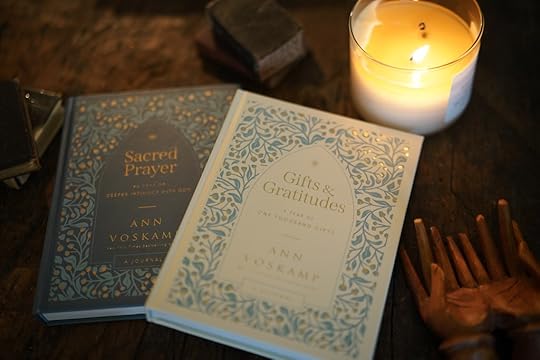
 1. Walk: Walk out Whatever’s Tangling You Up:
1. Walk: Walk out Whatever’s Tangling You Up: Finding some quiet pastures, a bit of green, a tree or two, a trail under some leaves, some still waters – is all a way to do more than what the Japanese call “forest bathing” by having what I call a long “glory soak,” getting outside and soaking in the divine glory that fills the whole world, a way to cleanse the mind, breathe in deeply and move your body to move the stress through.
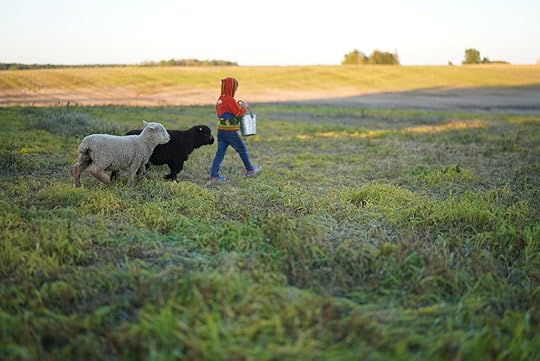
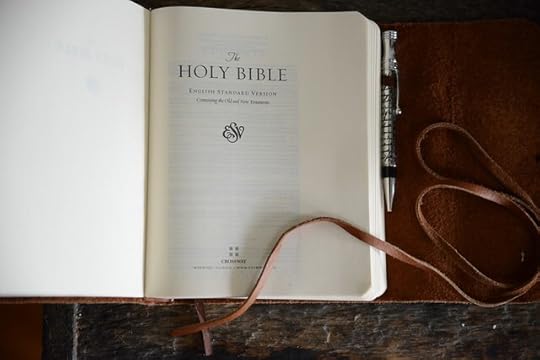
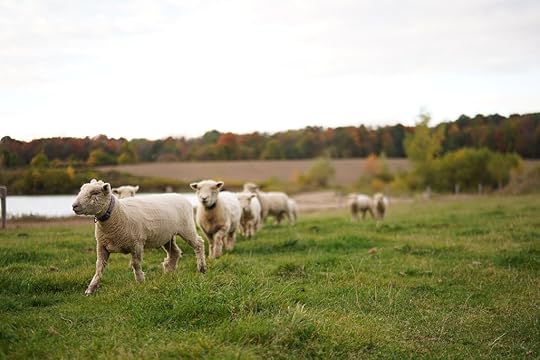 2. Word: Steeper the Mountain in Front of You, the More the need to Steep in His Word:
2. Word: Steeper the Mountain in Front of You, the More the need to Steep in His Word: Open His Word, read the Psalms, linger in the Gospels, sit with the epistles. Write down one verse and steep in the truth of it, relax into the reliability of it, chew on His Words, savor their sustenance, ruminate on the certainty of His promises, retreat into the refuge of the Word Himself, the Author who is lovingkind and can do nothing less than write a kind and redemptive story.
Carry around one verse and memorize it, because what you know by heart is what your heart really knows. And, even the research attests: the more you steep in His Word, the less stress you feel and the more strength you feel for any steep mountain.
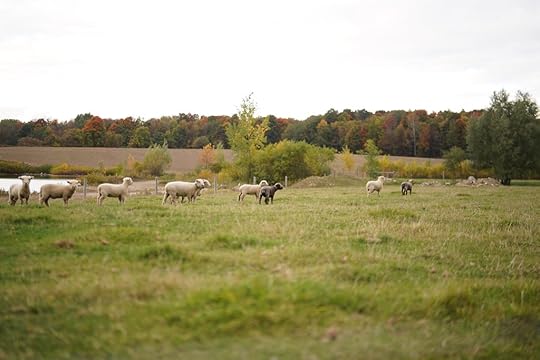
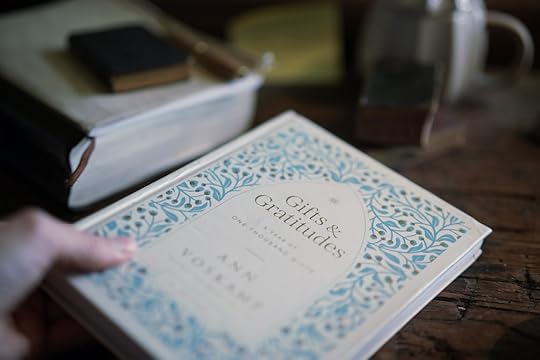

 3. Give Thanks: Giving thanks gives you an edge on peace.
3. Give Thanks: Giving thanks gives you an edge on peace. The neural pathways of your mind are actually their own kind of digestive tract: feed your mind angst and you feel sick with worry. Nourish your mind on the good, the gifts, the gratitudes, and you have more than a good attitude – your whole mind, body and soul feel good.
If Daniel, a man of prayer facing the lion’s den, kept praying three times a day with thanksgiving, just as he had always done, (Daniel 6:6) and Jonah in his distress, cried out with thanksgiving (Jonah 2:1-10), and Jesus faced his last dire hours at the Last Supper by taking what was given with grace and still giving thanks, and Paul offered the invitation to “not be anxious, but in everything, with prayer and petition, with thanksgiving, make your requests known to God” (Phil. 4:6) – then can we do any better than to
Slay all angst …with prayers of thanks
The neural pathways of your mind are actually their own kind of digestive tract: feed your mind angst and you feel sick with worry.
Nourish your mind on the good, the gifts, the gratitudes, and you have more than a good attitude – your whole mind, body and soul feel good.
Gratitude is the game changer that wins you more joy, less worry, and far more expansive trust because, just as you train your eyes to see the gifts of grace today, you’re training your heart to trust that there will be more than enough grace for the future.
The practice of giving thanks is actually giving you the gift of greater joy and peace and trust.
 4. Bless: The best way to De-stress is to go Bless:
4. Bless: The best way to De-stress is to go Bless:When we help others, we help our own hearts and all this hurting world…
It’s counter-intuitive. Stressed? Go Bless. “Helping behavious buffer stress” is what researchers at Yale discovered, and research discovered that more than 2 acts of kindness a day results in dramatic increase in mental well-being.
Send a text to someone who sees the world differently than you, drop off a cup of coffee for someone who isn’t often noticed, slip an encouraging word and verse into someone’s mailbox, a love note to them for just being in the world.
Give your time, your resources, your encouragement, volunteer, show up, surprise someone, make that phone call. Reach across the aisle, the street, the back fence and lower your stress by being a blessing. Be the G.I.F.T. and Give it Forward Today.
When we help others, we help our own hearts and all this hurting world…
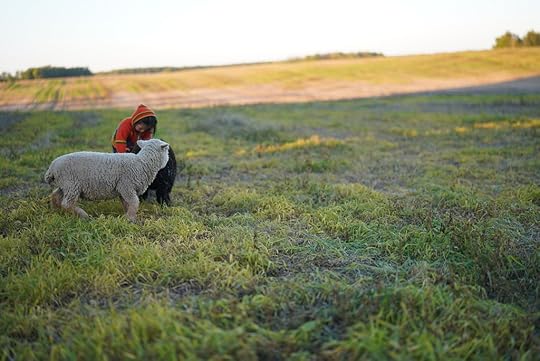


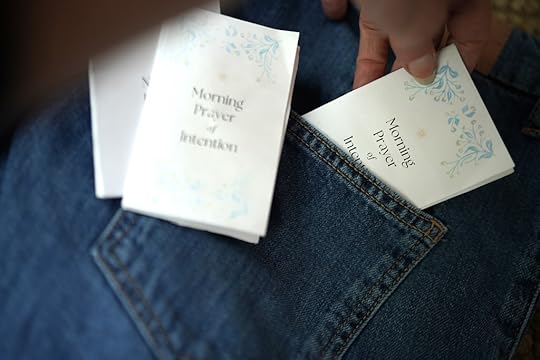

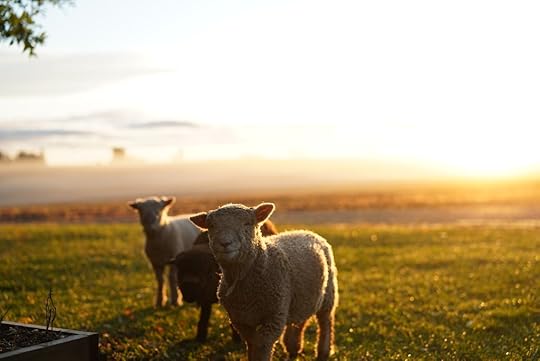 5. Pray…
5. Pray… Because those who pray? Just 12 minutes a day – actually literally grow the cingulate cortex of your brain, that manages your feelings. And you grow your cortex, and you grow nicer and more gracious. Pray and you literally receive a new mind – the mind of Christ!
Prayer isn’t the least we can do, and it isn’t all we can, but surely it is the most we can do…
Pray the way He taught us to pray, pray it as the rhythm that your own heart beats to:
“Thy Kingdom Come…”
No matter what unknown lies ahead at any point in time, that is what’s coming, that is what’s assured, that is how He taught us to pray:
What’s coming up around the next corner is always His Kingdom coming
What’s coming is His Kingdom,
whatever’s coming is always what’s been coming:
the sureness of His Kingdom that will outlast all kings,
the goodness of a loving-kind God on His throne,
the certainty that there is one real and forever Kingdom coming,
being ushered in, even right now…
And no matter how things settle out, God is always setting all things genuinely right.
No matter what comes across our path, Christ already went to the Cross and the tomb is empty, so our peace is anything but empty… And no matter how things settle out, God is always setting all things genuinely right.
No matter what comes across our path, Christ already went to the Cross and the tomb is empty, so our peace is anything but empty…
because there is a Kingdom coming
where love and truth,
grace and gentleness, mercy and holiness, strength and compassion, reign
and His Upside Down Kingdom
upends
all that is wrong
and ushers in the relief of the wholeness and completeness of
the shalom of God
without end.
And so He taught us all to pray, on every single one of our anxious days, praying for an otherworldly holy, cruciform love, on earth as it is in heaven:
Thy Kingdom come…
And after I finish feeding our little flock, and they all come, just simply come close… I quietly pray and reach out to touch gently touch the little lambs, and we all rest in the safety of sure grace.
Live into the Spacious, Non-Anxious Presence of God
When life feels anxious, give yourself the gift of more God & less stress, and a daily, beautiful retreat with: SACRED Prayer: 90 Days into Deeper Intimacy with God and Gifts and Gifts and Gratitudes: A Gratitude Journal for a Year of One Thousand Gifts
November 1, 2024
How Gratefulness Right Now Can Snuff out Fear & Fuel Hopefulness
Giving thanks gives reassurance
and gratefulness fuels hopefulness.
Giving thanks gives reassurance and gratefulness fuels hopefulness.
I write that epiphany down on a sticky note and stick it by the sink. Because it’s easy to forget the whole of your story, that there’s more to the story …
It’s easy for one hurting and very real part of your story to steal the headline of your life and hijack your tender heart.
It’s easy to think that the painful lines in your story mean there are no joyful lifelines in your story.




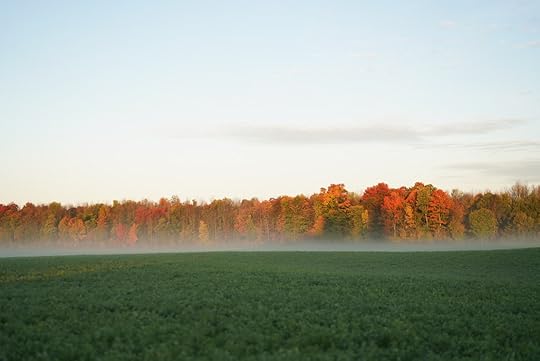
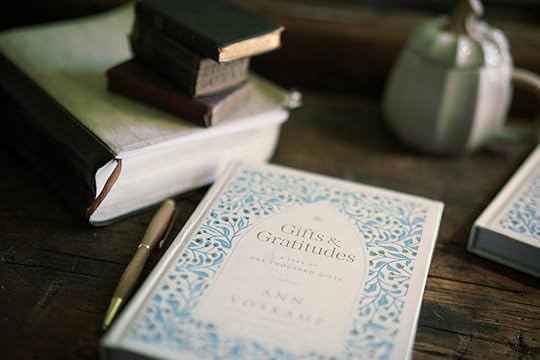
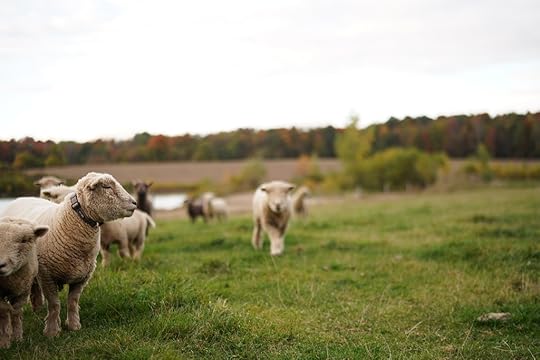
No pain gets to be the loudest part of your story, and no brokenness gets to claim your whole story and steal all your joy: There is heartache and there is still holy joy.
I hugged a woman this past weekend who drove her daughter home from chemotherapy treatments each week while they counted gifts and gratitudes out loud. As she told me, I couldn’t help but hug her tighter. Grace embraces you and doesn’t let go. Her tears fell honestly. Her brave smile still testified gloriously.
No pain gets to be the loudest part of your story, and no brokenness gets to claim your whole story and steal all your joy: There is heartache and there is still holy joy.
There is loss – and there is still love.
A woman who survived a category 4 Hurricane reaches out to grab my hand in a community that went 17 days without power, where people were looking for water and fuel and real help to pick up the twisted wreckage of their lives, and she tells me how she sat down with a piece of paper and a pen in the midst of everything, in spite of everything. Her husband asked her what in the world she was writing down.
“Gifts. So I can remember.”
She was still writing when she got to the 7th page of paper.
The grace story of God out writes every other story in the world.
And I nodded: “There are so many other things Jesus did. If they were all written down, each of them, one by one, I can’t imagine a world big enough to hold such a library of books” (John 21:25). The grace story of God out writes every other story in the world.
All kinds of hardships may be coming for all of us – and we have to have a way to remember that grace hasn’t ever, and never will, stop coming for us.
I sit at my old, worn desk that used to a blacksmith’s bench, and I reach for that Gifts and Gratitude journal to remember grace upon grace, gift upon gift, that I might see how God is forging a good story out all these days.
No matter what unknown the days ahead may hold.
When we thank God ahead of time — we get ahead of the fear.
When we thank God ahead of time — we get ahead of the fear.
The human brain either feeds off fear, or it lives on love — those are the only two sources of sustenance for our cerebral matter.
And fear and love are connected in unexpected ways: Fear happens when we love so fiercely that we grip tightly, panicked that we might lose what we love.
But real love opens hands and lives surrendered and giving, so that the love can grow even larger.
Open your hands to receive each day, each moment, as a love-gift from God, write down a few of your gifts and gratitudes each day, and what you’re doing is counting all the ways God loves you – and you’re fueling your brain on the love of God.
Whatever fuels you — is what you become. Count the ways God loves you, gift upon gift, and you’re fuelling your brain with the love of God, and you’re becoming love.
Or keep giving space to the fear — and you become what is feared, and you grow all the fear larger.
Come a new month, come November, and I keep coming to the pages of my Gifts and Gratitude journal because this is always the choice that keeps coming: Doxology or dark.
And I keep choosing gratitude because: Doxology is always the winning strategy.






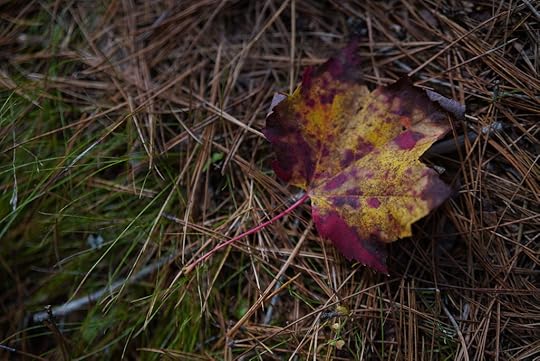
Gratefulness always dissipates fearfulness.
It’s an exhale to savour these simple things that are amazing grace, that are sacred things — divine love gifts:
Warm fall light and sitting in grass, steaming coffee warming hands, the sound of a pen scrawling across paper, the fragrance of fall candles, the mail lady’s smile, waving to a neighbor, laughing in unexpected moments in the middle of the day…
It comes like real relief:
Gratefulness always dissipates fearfulness.
And daily thankfulness gives you eyes to really see: You’ve already lived so many days that you said would make you joyful.
And daily thankfulness gives you eyes to really see: You’ve already lived so many days that you said would make you joyful.
This stops me hard.
When I look back there on today’s page of gifts and gratitudes, to see on that same page, all these gifts of love a good and loving God provided on this day of the month, on all the previous months, not only do you feel hopefulness for enough amazing grace for all the days to come, you realize:
The real fake news is that there isn’t all kinds of really genuine good news.
The Farmer had doctor’s appointments back to back this week. And an ultrasound to try to determine the source of the pain. Shiloh had clinic with her cardiologist to monitor her heart function. I sit with the weeping and grieving — and I weep and grieve. We pray. Sometimes anxiety is palpable and we intimately know the fear of the unknown.
The real fake news is that there isn’t all kinds of genuine good news.
And yet there it is:
When you have this daily way to keep looking for the good, to count Gifts and Gratitudes, so you know you can count on a Good God, you remember the rest of the story, the good still in the story – and how He is re-membering and restoring and re-storying you.
Come the beginning of November, the last of the leaves fall off the trees, this letting go into a grateful surrender, letting go into the hopefulness of the story and the next season coming.
Pick Up Gratefulness to Fuel Hopefulness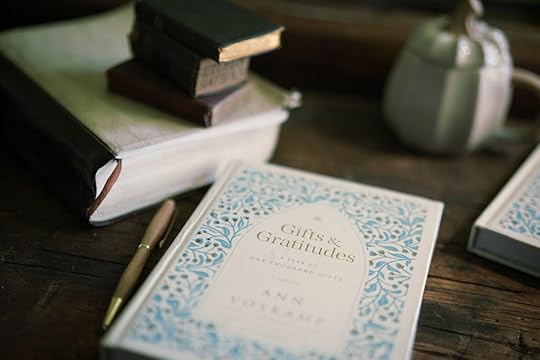
Pick it up here: Gifts and Gratitudes: A Year of One Thousand Gifts
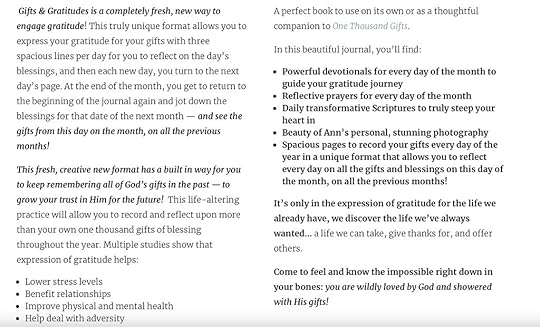
Pick your copy here: Gifts and Gratitudes: A Year of One Thousand Gifts
October 30, 2024
Why Still Keep Praying? 5 Secrets to Calming, Comforting Prayer (& Free Pocket Prayers)
I hear an analyst say this week that the question she is getting most these days is, “Are we going to be okay?” Are we going to be okay next week, next month, next year, are we going to be okay no matter what happens, are we going to be okay to be neighbours and communities and all fellow members of the family of humanity and how do we pray to be okay through days like these?
I lean in toward a mother who tells me this week that her 12-year-old son’s asking her why bother to pray when God already knows everything, rules over everything, decides everything?

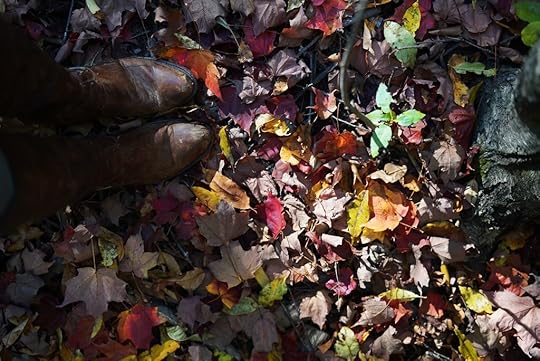
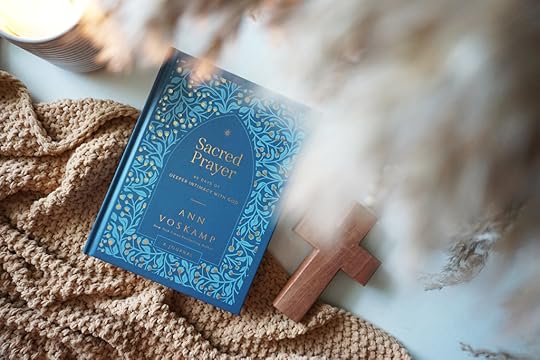


I’m standing beside a young woman in a cafe on one on of the last warm nights of October when she takes this call, cups her mouth in her hand as she shakes her head in wide-eyed disbelief, over and over again. She will stammer it out to me afterward: A woman in her circle, who hasn’t been a mama more than a handful of days, just died by postpartum depression. Her baby is only handful of days old. I ask for their names so I can pray, because there are real reasons why I believe: Prayer isn’t the least we can do, and prayer isn’t all we can do, but prayer is always the most we can do.
I sit with my father-in-law who just marked the milestone of completing his 90th year on this planet, and his wrinkled hand pats mine, tells me, “I pray for every single one of you every day,” every single one of his 7 children, and each of their children, and each of their grandchildren, his great grandchildren. This is doing the work. This is doing the work into your 9th decade on this planet, till your very last breath.
When we pray, we’re turning to face the presence of Love who comforts us. And the reality is: Real comfort is only found in real intimacy with the Comforter Himself.
His oldest daughter writes us all: “I have a real sense that what Dad doing now is passing the ‘praying for family’ baton unto us children.”
“I’m not sure anything matters more than this legacy,” I’m choked up.
This is no small thing and this is why we pray in a hurting world:
Only when we pray and invite the life of God to take root in us, can we bear the ache of this life.
We only become love, when we pray and bear one another’s burdens with love.
When we pray, we’re turning to face the presence of Love who comforts us.
And the reality is:
Real comfort is only found in real intimacy with the Comforter Himself.
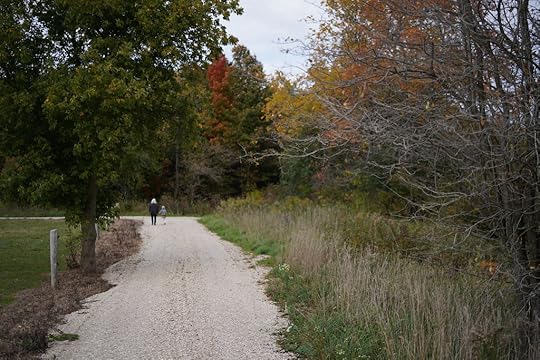
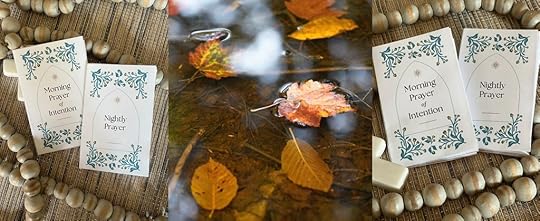

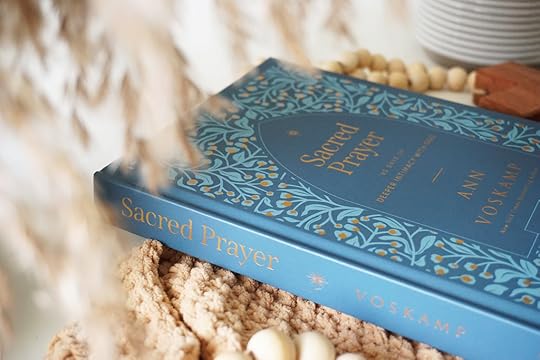

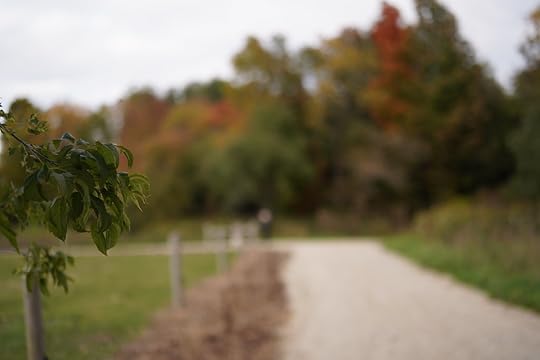
Human behaviour researchers suggest that in the midst of heartbreaking situations, in the face of danger, of threat, of trauma, that we as humans have these 4 possible responses: Fight, or Flight, Freeze or Fawn.
They say: “There are no atheists in foxholes.” Which is to say: Find yourself taking any incoming fire, and you find yourself taking the way of prayer.
They say we can either aggressively Fight our way through, or we can take Flight from whatever is in the way. They say we can either Freeze, like deer caught in headlights, there on the way, or we can flatteringly Fawn, in an attempt to please and pacify whatever is in the way.
And in the face of profound loss and painful lament, it can feel like there are only one of those 4 ways before us: Fight or Flight, Freeze or Fawn.
But there is always another real and powerful response that every single human being has experienced:
Find yourself in any foxhole and you find yourself praying.
The need to pray is instinctive, and the response of prayer universal, and the default of prayer is the way every human was made, because, don’t we all know it: “There are no atheists in foxholes.”
Find yourself taking any incoming fire, and you find yourself taking the way of prayer.
And when we take the way of prayer — this is partly what happens within us:
“Praying involves the deeper parts of the brain: the medial prefrontal cortex and the posterior cingulate cortex — the mid-front and back portions,” says Dr. Spiegel, director of the Center for Integrative Medicine at Stanford University School of Medicine, referring to what can actually be seen in the brains of pray-ers through magnetic image resonance (MRI). When we pray, we activate this medial prefrontal cortex and the posterior cingulate cortex, which is activating these parts of the brain involved in reflection and soothing.
Choose to pray, to soothe the pain.
Which is to say:
Choose to pray, to soothe the pain.
Prayer is what moves you from being wildly reactive to wisely reflective.
Which is exactly what the ancient sacred text says: “Do not be anxious about anything, but in everything by prayer and supplication, with thanksgiving let your requests be made known to God. And the peace of God…will guard your hearts and your minds in Christ Jesus” Phil. 4:6-7
Prayer is what moves you from being wildly reactive to wisely reflective.
When we pray with thanks, God chases away fear.
To pray is to be in the presence of God who is our peace.
Stress and trauma may cause hyper activation of our limbic system, and the Fight or Fight, Freeze or Fawn responses, can impair our executive functioning— but it’s prayer that activates our prefrontal cortex, that rules our executive functioning, so that we regain wise footing, so that we reorient and re-center, so that we can re-fuel to take a more fruitful way.
Prayer isn’t blithe inaction; prayer is fuelling to take the best action.
Every human being has more response options before us than only Fight or Flight, Freeze or Fawn — we have the option to Fuel … to be more Faithful.
Prayer is the fuel that ignites the most faithful way forward.
Prayer isn’t blithe inaction; prayer is fuelling to take the best action.
Praying involves reflection — so the way forward is more clearly reflected to you, and you more clearly reflect the loving ways of God.
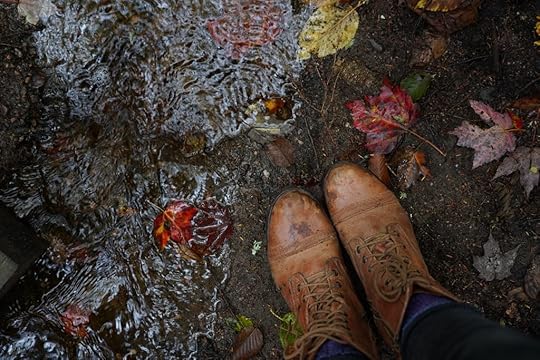
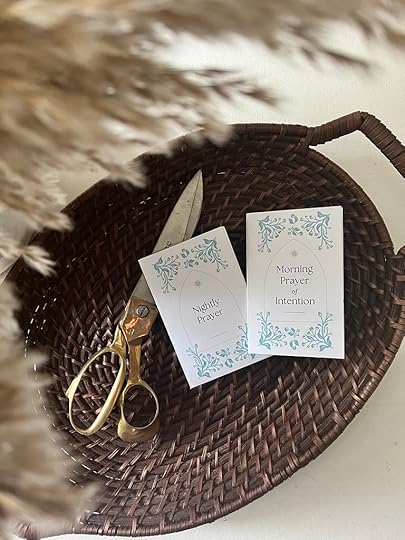

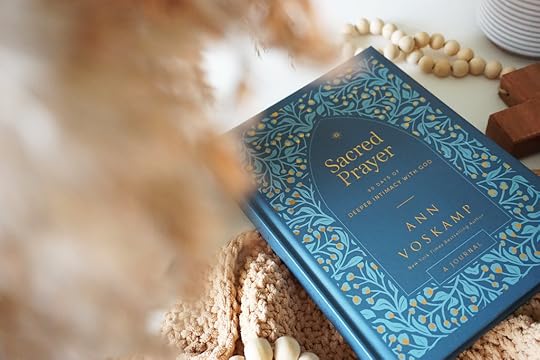

“A changed world begins with us,” writes the theologian Eugene Peterson… “and a changed us begins when we pray.”
This is what my professor in my doctorate of ministry program in soul care and faith formation at Biola knows when he challenges our class with this real work:
Begin each morning in intimate communion with the Lord and a Morning Prayer of Intention… then every day consistently pray your way through each of the 150 Psalms, once in the words of Scripture, once in your own words…. and then close each day with a nightly prayer of examine.
Prayer is the fuel that ignites the most faithful way forward.
The theologian, Timothy Keller, who may have been the CS Lewis of our times, he stopped and prayed 5 psalms a day, throughout the day, every day, for the last 20 years of his life. That’s praying through all 150 Psalms, every single month, 12 months of the year — year after year, for 20 years.
This is the real work — the real work that changes us, that ushers in more of the Kingdom of God that changes the world. This is the primary work of a lifetime, this is the work worthy of your life.
I steady into this work these days, this daily rhythm of daily prayer, often taking prayer walks through the farm’s back woods, carrying these folded prayers in my pockets, these Psalms and laments, praise and thanksgiving, petitions and pleas.
Fold all your worries into prayers, a letter letting God know your heart — so you can read more of God’s heart.
As I sit at my desk, or walk through the woods, or pause with our open Psalter there at our coffee maker, I daily unfold these little folded booklets of prayers, what I call my “Pocket Prayers,” humble heart prayers I carry around in my pocket, and I think of one of the most powerful stories I’ve ever heard, one that Dois Rosser writes of how:
An Eastern European government granted a group of believers some swampland, in a region that used to be under communist rule, for the construction of a church. It took a long arduous, six months of hauling wheelbarrow after wheelbarrow of dirt to fill the marshy bog and create a suitable building site, but when the believers were finally ready to begin actual construction, they had run out of sufficient funds to build.
But local officials granted the community of believers permission to dismantle the stones of a nearby unused nuclear missile silo, a remnant of the Cold War. As the believers were dismantling the stones of the nuclear missile silo and carrying the stones to the building site of the new church —– one of the men put found a fragile slip of paper, rolled tightly and stuck between two stones. Others gathered around as he carefully unrolled the old paper and smoothed it flat.
And the Christian man read slowly it slowly aloud, the faded ink of the decades-old words : “These stones were originally purchased to build a house of worship. But instead these stones were confiscated by the government to build a nuclear missile silo. May it please the Lord that, one day, these stones will be used to still build a house to His glory!”
The folded prayers between every rock and a hard place can unfold into answers in the most unexpected places.
Old prayers can unfold into answers whole lifetimes later.
Old prayers can unfold into answers whole lifetimes later.
And we are all these folded prayers that can be read by the generations after us. There is unspeakable power and relief in the truth that: You don’t have to see the answer to your prayers for your prayers to eventually see answers.
All our prayers are like small, folded seeds that can open and unfold into answers and an abundant harvest long after our lifetimes.

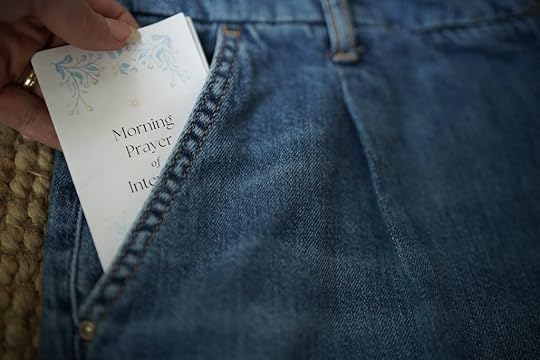
 [image error]
[image error]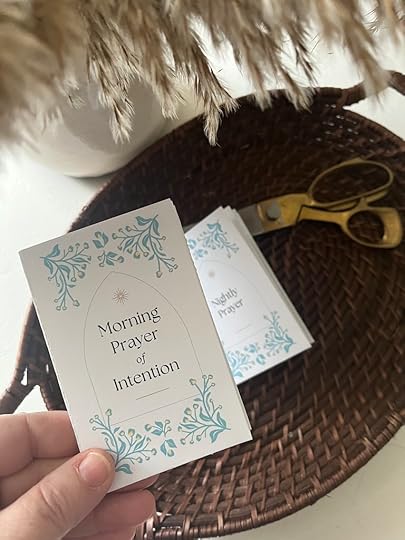
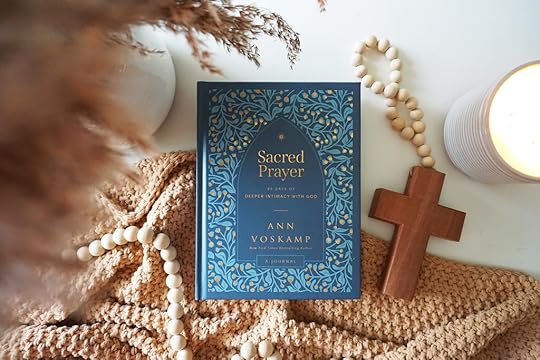

This is what I keep doing, for this is the daily real work: Fold all your worries into prayers, a letter letting God know your heart — so you can read more of God’s heart.
I can’t imagine life now without this practice of carrying around these Morning and Nightly Pocket Prayers, I can’t imagine now not carrying around prayers and actually being carried by prayer — actually becoming prayer. A friend and I keep connecting with each other about how we so look forward every morning to sitting down with our worn copies of Morning Pocket Prayers — and then carrying them with us all day — because they are absolutely revolutionizing the way we see life… the way we are being in our life.
When you pray, you always know you are going to be okay, because prayer moves you from being caught between a rock and a hard place and into the sure safe heart of God.
Under fall skies, through so many tender, strange days, I keep unfolding these morning and nightly Pocket Prayers in my open hands… and my soul keeps unfolding into prayer.
Wherever we pray with open-surrendered hands, God takes our hand and all is well because we know we’re held.
Come Away into a place of Prayerfulness & Thankfulness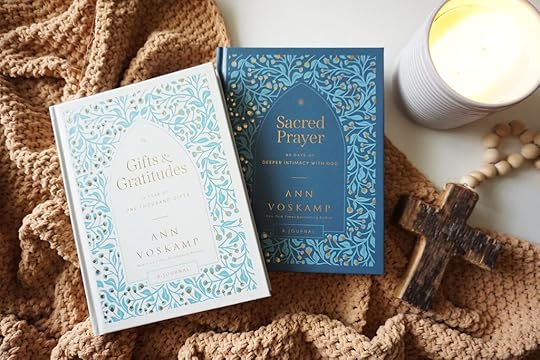
Do your soul a favour & frame your days with beginning in prayerfulness & ending with thankfulness with our 2 new journals: Sacred Prayer, a way of life to move with the Way Himself & become prayer & Gifts and Gratitudes -a fresh new way to give thanks & see the gifts from this day of the month on all the previous months, to grow trust in God providing for you in all the coming months!
Come on into our Free Library of Printable Resources & download your own Free Pocket Prayers
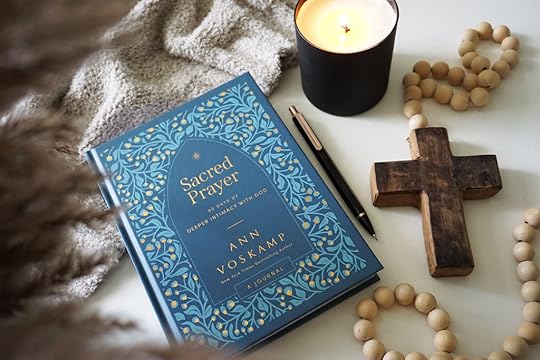
Come away… & live a way of life, a way of thinking, that becomes a prayer: SACRED Prayer: 90 days of Deeper Intimacy with God
October 28, 2024
Your family is no accident but God’s good plan
For a mom keeping many plates spinning every day, it can be easy for the daily demands to close in on my heart and mind. I can feel small. I can forget the bigger story God is telling through me and my family – yes, even my family. Ray and Jani Ortlund have experienced family life with lots of spinning plates! Now they have written two new books – one for adults, the other for children – to encourage our hearts with how much we actually matter, far into the future. Ray and Jani are some of my most favourite people — people who have discipled me and mentored me through their lovely letters and cruciform leadership. It’s a true joy and honour to welcome Ray and Jani to the farm’s table today…
Guest post by Ray and Jani Ortlund
You are a person of historic significance. God thinks so.
His plan for world history includes you. In fact, he “works all things according to the counsel of his will” (Eph. 1:11). How can that not include you?
And if it includes you, doesn’t it include your family too?
You and your marriage and your children are no accident – including that “surprise” baby you didn’t budget for! (We have one of those!) God has a thrilling purpose for your family, a purpose that extends long into the future.
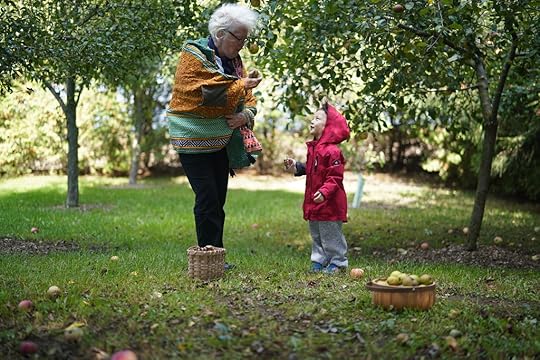
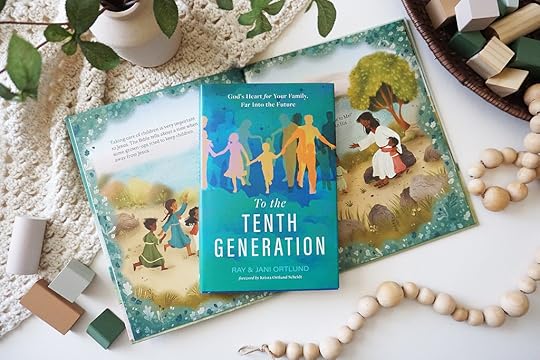
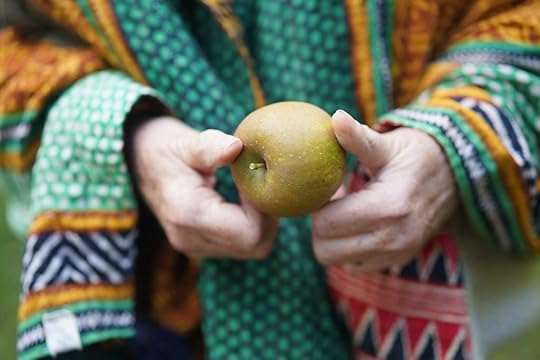
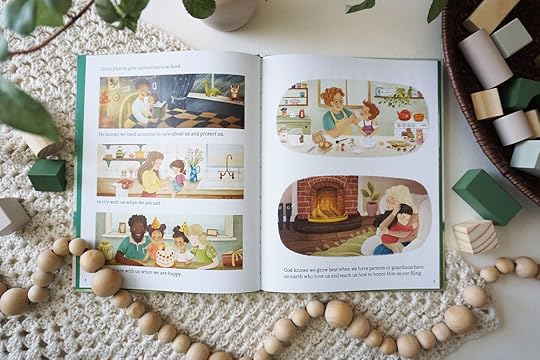
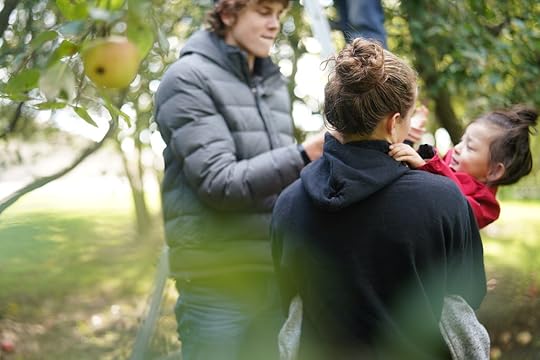
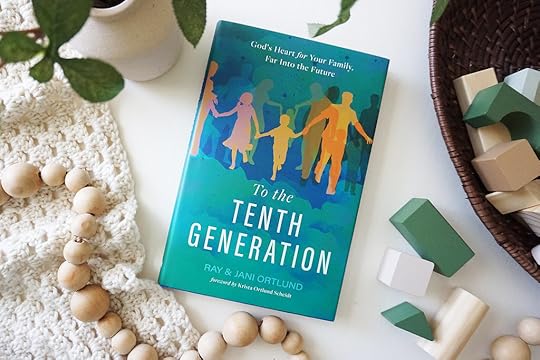
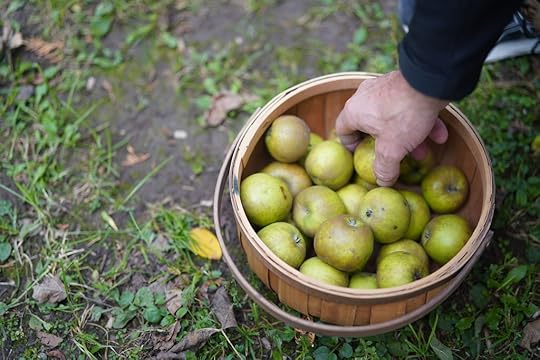
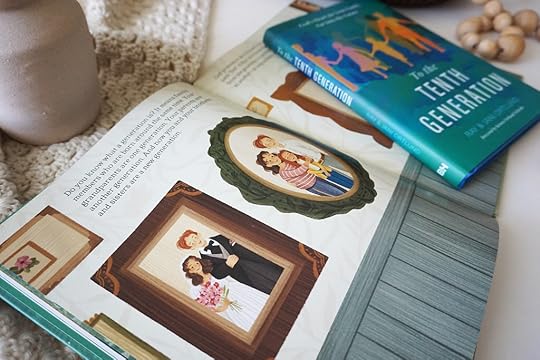
We’d like to get you thinking bigger thoughts about yourself and your family’s place in God’s plan. Bigger thoughts grow bigger faith. And your faith will change the story your life will tell for generations to come.
“…your faith will change the story your life will tell for generations to come.“
For us, long-term thinking about our family was a big change. Thinking two weeks ahead, even two years ahead – we knew something about that. But thinking out, say, two hundred years? Those were completely unexplored thoughts!
Here is what opened our eyes. Years ago, Jani was reading her Bible . . .
. . . just enjoying my morning devotions – reading in Deuteronomy, no less – when something leapt off the page at me:
“No one born of a forbidden union may enter the assembly of the LORD. Even to the tenth generation, none of his descendants may enter the assembly of the LORD” (Deut. 23:2).
“If God excluded certain people to the tenth generation, how much more does he long to include people to the tenth generation!”
Whoa, I thought. That’s serious! God excluding a family line from his presence? For ten generations? How does that make sense? If every page of the Bible, from cover to cover, is ultimately meant to show us Jesus and his gospel, what part of the good news was I supposed to see in this?
Whatever else is going on in this Old Testament passage, it must be preparing us for the assurance of the New Testament, that in Jesus alone, we who do not deserve to stand before a holy God have been invited and welcomed into his presence (Acts 11:17-18; Gal. 2:15-16).
Oh, my, the thoughts were swirling in my mind now. I was asking the Lord for help to see his heart more clearly. That’s when a new thought occurred to me: “If God excluded certain people to the tenth generation, how much more does he long to include people to the tenth generation!”
Doesn’t he always delight more to bless than curse, to receive than reject, to welcome than banish? Yes. Much, much more!
And if, back in Deuteronomy, God banned their descendants “to the tenth generation,” how might the how-much-more heart of God bless our family, and your family, to the tenth generation?
The generational blessing of God, stretching out over our family into the distant future, left us breathless – more excited, and more responsible.
More excited? Yes! We started thinking about our family in expanded dimensions, beyond the children and grandchildren we know and love right now.
More responsible? Yes! We began daring to pray more boldly, asking the Lord to bless our family to the tenth generation.
“God is advancing his own mission, and we just want to be involved... Could we live for any cause more worthy and more certain of success?“
And if a generation comes of age every twenty years or so, we’re now praying that every one of our descendants will love the Lord Jesus Christ for the next two hundred years!
Sometimes this vision for our family feels crazy even to us. But then we remember, God himself has been preparing us for this mission our whole lives. We are preapproved by his grace to “go for it” – in prayer, in purpose. We therefore accept responsibility to be flow-through-able as parents and grandparents, inspiring our future generations to stand for Christ.
Not that we are advancing God’s mission. God is advancing his own mission, and we just want to be involved. He sees our hearts. And he sees your heart. He knows how it works best for each of us. Let’s all keep saying yes to whatever he asks us to do. Could we live for any cause more worthy and more certain of success?
[image error]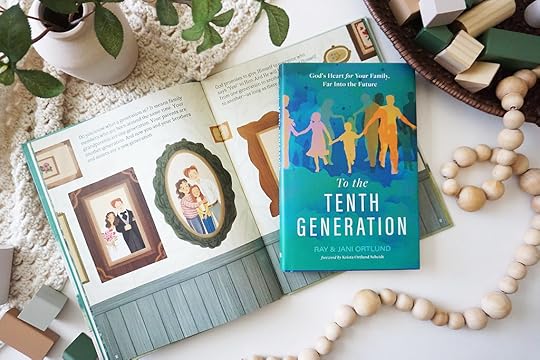
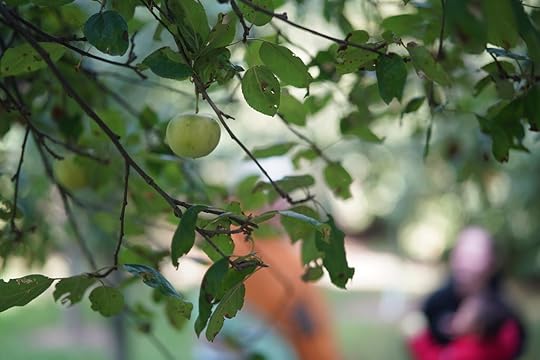
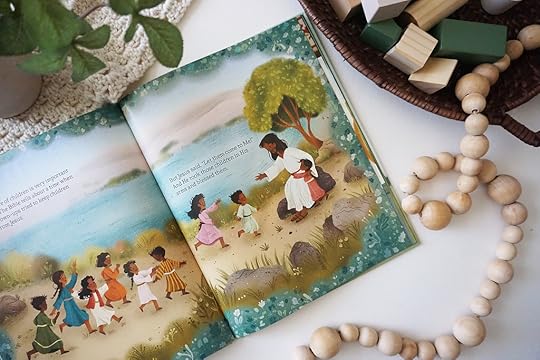

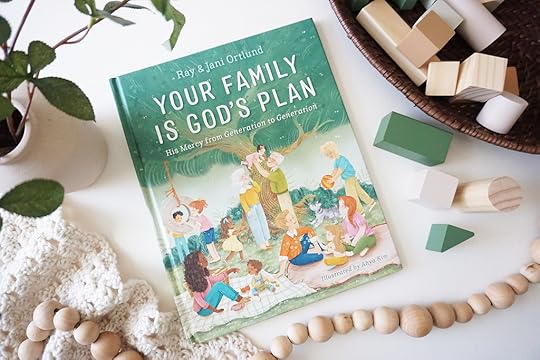
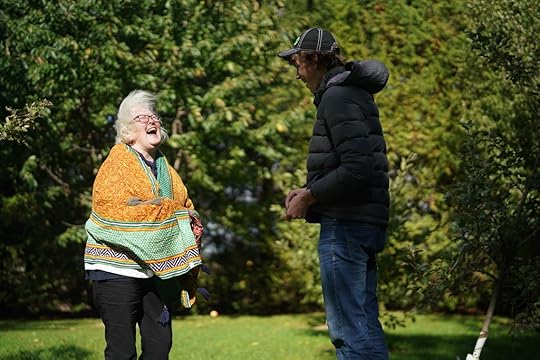
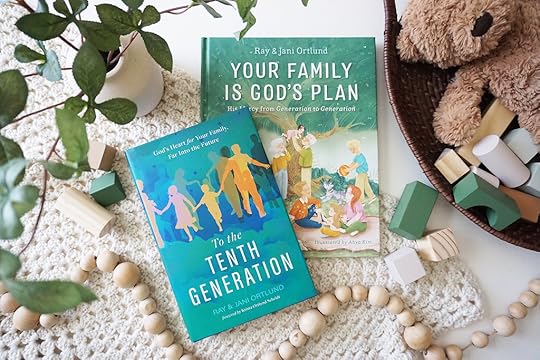
The encouraging fact is this. The risen Jesus is sprinting through our world today, right now, at this very moment, saving people right and left. He’s not tired, and he’s not making it up as he goes. In eternity past he resolved upon this sacred commitment: “For the promise is for you and for your children and for all who are far off” (Acts 2:39). Our mighty Christ is why we aren’t wringing our hands and moaning, “What’s the world coming to?” Instead, we are rejoicing and declaring, “Look who has come to the world!”
So here is the biblical and audacious belief we are inviting you to embrace:
God gave you your precious family
to play a crucial role in his strategy
for the redemption of the world.
And it can start so simply – with a prayer like this:
Lord, I’m afraid for my family.
In this world there is so much against us.
But I look to you.
Your kingdom come, your will be done,
both in me and in my family,
to the tenth generation.
In the holy name of Christ.
Amen.
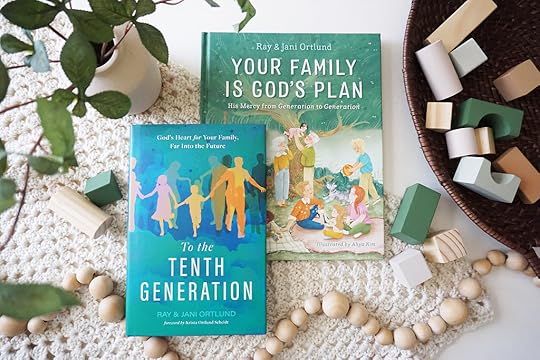
Ray and Jani Ortlund serve with Renewal Ministries in Nashville. They wrote To The Tenth Generation and Your Family is God’s Plan because they believe in “the how-much-more heart of God” for their family and your family. They long for you to know how much you actually matter, and how that awareness can help you today, even right now. I am thrilled to have these books in my hands and know they will minister deeply to me and my family.
{Our humble thanks to B&H Books for their partnership in today’s devotional.}
October 7, 2024
The First Step in Rebuilding Your Life After a Soul-Crushing Loss: Reconnect with God
Loss can be a soul-crushing experience, leaving us feeling untethered and adrift. Whether it’s the death of a loved one, an unexpected career change, a miscarriage, or the end of a friendship, each loss creates a void in our hearts. Yet, amidst the grief, there comes a time when we’re called to see the beauty in life again and begin to rebuild. There comes a time when God will call you to create something new for yourself. Today, we welcome Dawn Mann Sanders to the front porch—a fellow “rebuilder” who has navigated profound loss twice and emerged stronger. How do you rebuild when your world falls apart? It starts by letting God restore your power, reconnecting with Him, and trusting that you’re always in His grip. It’s a joy to welcome Dawn to the farm’s table today…
Guest Post by Dawn Mann Sanders
On June 10, 2011, God woke me up the morning after my husband Reggie’s death.
To say his death wasn’t a desired or pleasurable invitation is the understatement of my life.
The loss of my husband equated to the end of the world as I knew it. The last thing I wanted to do that morning was to live in a world without him in it.
When God woke me up that morning, he invited me into what felt like an impossible situation. As far as I was concerned, it simply couldn’t be done. I couldn’t do it. I didn’t want to do it.
My husband had just died and I was powerless to change it.

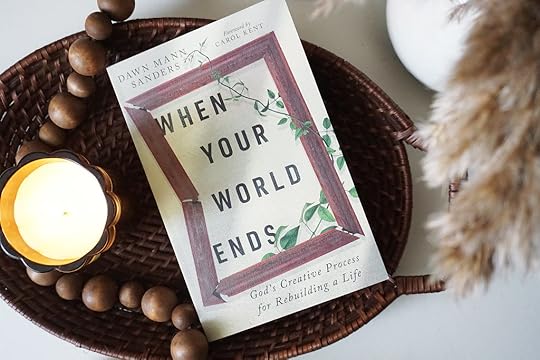

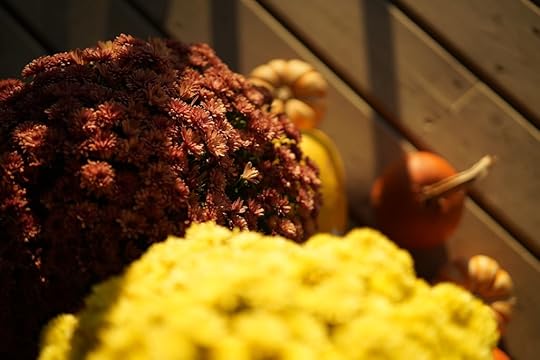
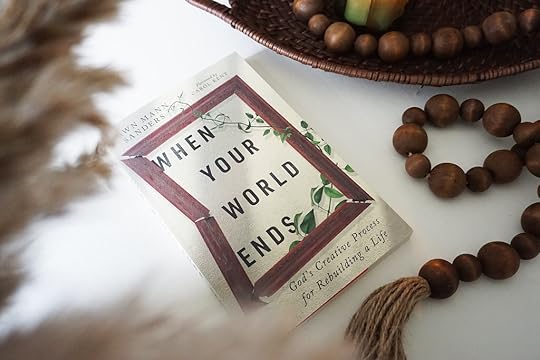

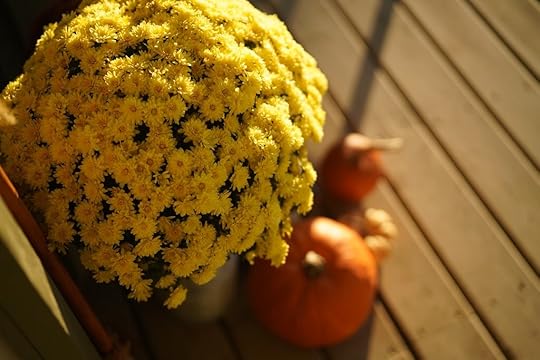
In moments of despair, invitations hold immense power. They have the ability to transform lives and shape destinies. How we respond to these invitations determines the course of our journey. They can create the possible and the impossible. That morning, amid my grief, God invited me into the impossible.
“In moments of despair, invitations hold immense power. They have the ability to transform lives and shape destinies.”
Reggie was a gifted encourager and supporter. Most importantly for me, he was my champion. When he died, I lost that encouragement and support. I lost my champion—the most tangible part of my support system at the time. It’s no wonder I felt unsupported. It’s no wonder I felt untethered.
Living through the end of the world as you know it often feels as though you’re floating through life untethered. What’s more, you’re floating above a shapeless void—a shadowy abyss.
As we see from Genesis 1:2, hovering or floating untethered is by design. It’s the first step in God’s creative process for rebuilding a life. You feel untethered because you’re no longer tied to the part of your life that just ended, but feeling disconnected from your old life doesn’t mean you have to feel disconnected from God—at least, not for long.
Once I realized I was right where God wanted me to be—untethered from my old life—my struggle began to end.
I didn’t need to be afraid because my position wasn’t untenable. I wasn’t hanging by a thread or cord, as with bungee jumping; I was suspended by and with the Spirit of God. Even though there was an abyss of disorganization, desolation, and darkness as far as my eye could see, I didn’t have to fall into that. I could rest easy. I didn’t have to worry I’d drift away—because God’s Spirit had me. He still has me. I’m in the Spirit’s grip.
Even when I wander, I don’t have to worry. I’m still in one place—his grip. I’m not going very far because God’s got me.
He’s got you too, friend.
“I didn’t have to worry I’d drift away—because God’s Spirit had me. He still has me. I’m in the Spirit’s grip.“
So it’s safe to reconnect, then remain connected, because God never disconnected. His Spirit had us and His Spirit’s got us.
You see, before God can change our lives, His Spirit must first change us—beginning with our perception. To do this we must break with the past. To succeed at creating a new life, we must first break with our old self and remain poised uncertainly between our old self and new self. Easier said than done? I know.
It took time for me to see my life without Reggie. Watching him fade from my future hurt, so I held on to my image of us together for as long as possible. Unfortunately, this attachment to our shared image caused me to lose touch with God’s plan for my life, because he already saw me and my future differently.
So I wasn’t aligned with God.
I found myself caught between two life visions: my past vision with Reggie and God’s new vision without him. I was torn, unsure which path to follow—yearning to be with Reggie, desiring to be with God, yet not completely separated from nor connected to either.
Remaining close to and resting in God gives us strength to follow, even when torn between our old life and our new one.

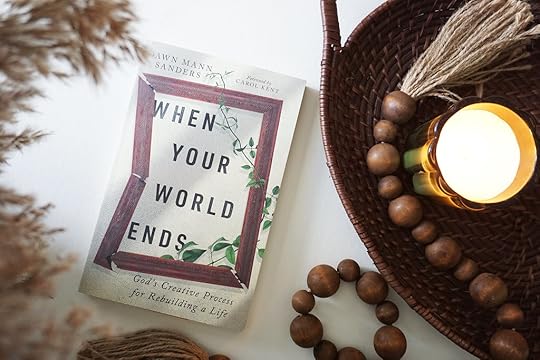


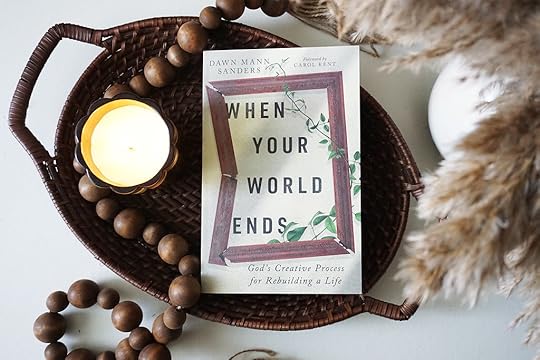
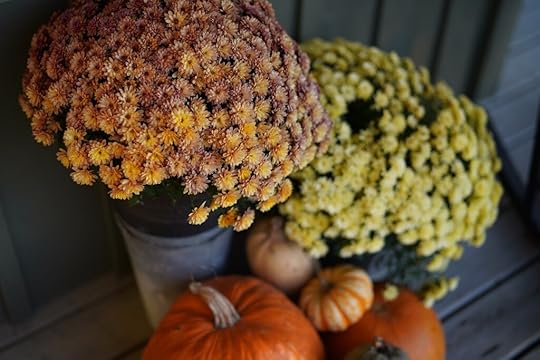
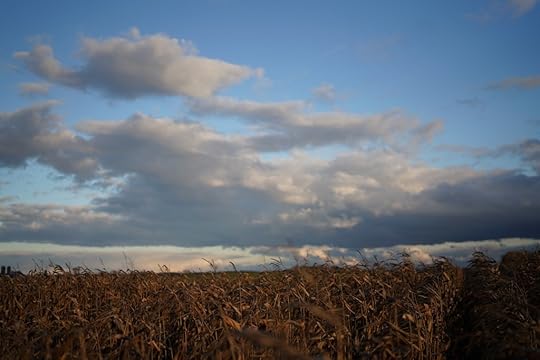
“Trusting God by rising above, even when we feel untethered and disconnected, caught uncertainly between two states, is taking the first step in creating our new lives.“
It’s abiding so we can “bear much fruit,” even when we want to fall back into the comfort of our previous normal or worse—the abyss. Trusting God by rising above, even when we feel untethered and disconnected, caught uncertainly between two states, is taking the first step in creating our new lives.
To create our new lives, it’s crucial to remain connected to God. Remember: forward movement requires forward thinking—and the quickest way to obtain forward movement is to follow him, not to look back longingly at what we’ve lost.
It’s our delay in trusting him that keeps us from reconnecting – from creating our new lives.
We aren’t powerless. We can choose restoration. We can choose to trust God, then join him in his restoration of us and the rebuilding of our lives and communities.
And when a new life is being created, limbo – the place between endings and beginnings – is where restoration begins.
“…when a new life is being created, limbo – the place between endings and beginnings – is where restoration begins.”
Therefore, the limbo you now find yourself in is your opportunity to reconnect and recharge. It’s where God begins to restore any power you lost – and any peace.
If you’re feeling untethered, if you’re uncertain or torn, if you find yourself waiting, or if your energy levels have dropped, rest easy.
Trust God’s got you and reconnect. Abide and bear much fruit. Remain connected and begin to create your new life.
Adapted from When Your World Ends by Dawn Mann Sanders. ©2024 by Dawn Nicole Sanders. Used by permission of InterVarsity Press. www.ivpress.com.
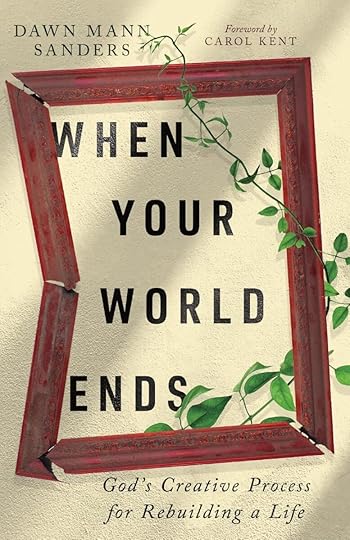
Dawn Sanders (MDiv, Bethel Seminary) is an associate minister at First Baptist Church of Glenarden International (FBCGI), where she serves as the director of the sermon-based life groups ministry. Her passion is expository teaching and sharing the wonderful insights God has shown her in his Word. She does this through writing weekly discussion guides for the life groups as well as teaching several in-depth Bible studies. Dawn has written and taught extensively on overcoming adversity and creating a new life, both at FBCG and on her personal blog.
Catastrophic events often feel like the end of the world. When we feel like we have nothing left, we sometimes wish for our own end too. Yet God keeps waking us up every morning—a sign that God wants us to keep living when our world ends. We must find our way to the new life that awaits us on the other side of loss. But how? Dawn Sanders has traveled this path before and lived to tell the tale—not once but twice. After a divorce and then the sudden death of her second husband, Dawn discovered a buried treasure in Genesis 1: God’s process for creating new life out of chaos. In When Your World Ends, Dawn digs deep into the creation story and unearths a seven-step process by which God brings us out of the void and into new beginnings. With her unique perspective, authenticity, and courage, Dawn meets those who are starting over and guides us into renewed hope.
{Our humble thanks to IVPress for their partnership in today’s devotional.}
October 4, 2024
Unqualified Yet Compelled: Why I Must Write About God’s Love
In Love Has a Story, author and poet Quina Aragon shares how, before the foundations of the earth, the great storyteller was penning a story that included you. Love was thinking about you, imagining ways to showcase His love for you, and planning to rescue you. This was not one of those sentimental loves, but a love that would traverse the wilderness in search of and for His beloved . . . and give everything—His life, blood, wounds, hope, and an invitation to be family. It’s a joy to welcome Quinn to the farm’s table today…
Guest Post by Quina Aragon
I’m sure you already know, but it’s worth repeating, isn’t it? The Bible’s story is the greatest love story ever told.
Or like the lyrics my Puerto Rican grandmother used to sing:
“Es la historia de un amor, como no habra otra igual.”[1]
“It’s a love story, like no other that will ever exist.”
In my latest book, I invite you to explore God’s love as it has existed and moved throughout and before time, and how it intends to transform your own life story. My premise is simple: love has a story, and you’re a part of it.
But, I have to confess: I have no business writing about the love of God.
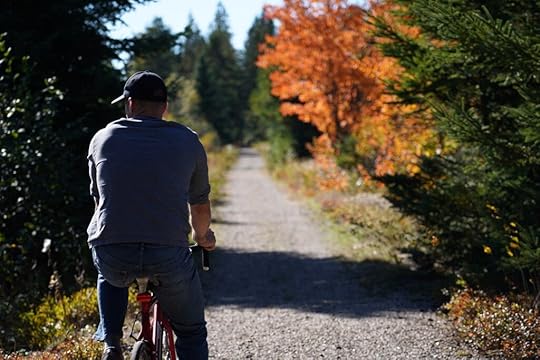

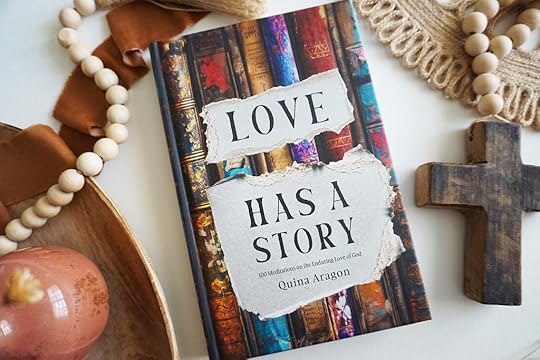


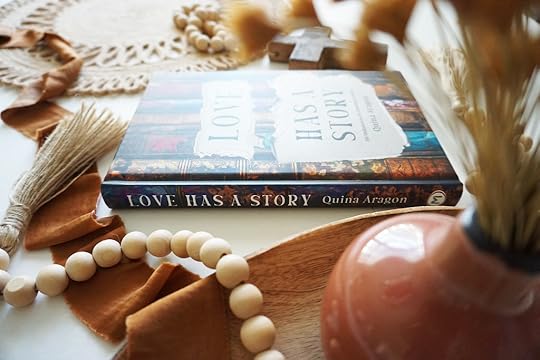

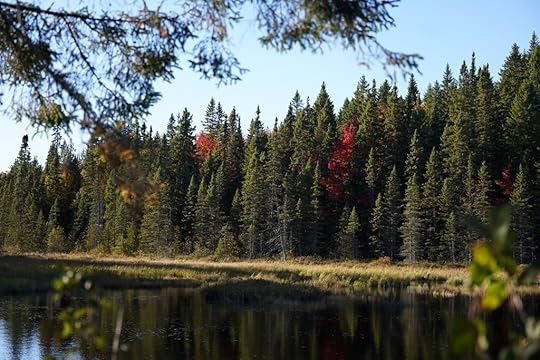
There’s something you’ll see in some of my own personal poems interspersed through my book. I sometimes—and sometimes more than sometimes—have a very hard time viewing my own story as redemptive.
“I sometimes—and sometimes more than sometimes—have a very hard time viewing my own story as redemptive.“
In my darker moments, I find myself standing in the shadowy hallway of traumas I’ve suffered, many of which compounded just as soon as I first trusted in Christ at age 16.
I hear whispers, and sometimes shouts, that I’ll never escape this hallway. I see doors open in this hallway and the shadowy figures of my reenacted traumas, the abandonments, the emotional abuse, the sexual abuse, the spiritual abuse, the overwhelming regrets—all poking out. I struggle to see any door with a bright green Exit sign.
In those moments/days/months, I hardly hear God’s love singing over me. Instead, I hear: “You’ll never escape,” and “You’re a worthless failure.” Sometimes, even: “God isn’t here. He’s not even real.”
I suffer from a mental health condition called complex post-traumatic stress disorder (CPTSD), which can develop when a person experiences chronic (long-term) trauma and stress. For most of my teenage and adult years, I assumed my intense difficulty with emotion regulation, sense of self, and relationships was just a matter of being a really bad Christian. I didn’t understand how prolonged traumatic stress had affected my brain’s chemistry and nervous system.
I knew Jesus died for my participation in evil acts, words, and thoughts. But I didn’t understand—at least not experientially—how Christ’s incarnation spoke to the goodness of my body, how His crucifixion spoke to His solidarity with abuse victims, and how His resurrection spoke to the promise of the future healing and transformation of my damaged mind, soul, body—and story.
“I didn’t understand how His resurrection power, even now, includes His still-scarred hands touching my own scars, bringing life out of my worst wounds . . . like Him.“
I didn’t understand how His resurrection power, even now, includes His still-scarred hands touching my own scars, bringing life out of my worst wounds . . . like Him.
For the last five years, through compounded traumas that broke me in ways I’m still recovering from, God has graciously taken me on a journey of rediscovering my own story with the help of mental health professionals, loving church community, and much time spent wrestling, lamenting, and learning from “the God of all comfort” (2 Cor. 1:3).
In the middle of writing my book my back gave out, and I was told in the hospital I might die that night. I was discharged the next day with no diagnosis by a doctor who insisted my back pain came from abusing drugs.
Wild.
As I spent every day going from specialist to specialist, disputing claims with my insurance, and trying to find ways to assuage the pain, I had to stop working altogether.
I’ve spent the last four years trying to finish writing this book while being (seemingly) interrupted by the intense grief of secondary infertility, four major surgeries for stage 4 endometriosis (resulting in the loss of six organs), a fifth surgery, debilitating and still-undiagnosed chronic back pain and fatigue, as well as the inconceivable loss of family and friends.
Those losses are not all limited to death, by the way, but deportation, and with others, unresolved conflict. My stomach sinks even writing that.
This book was supposed to be a 10-month writing project. It has turned into a much bigger story for me.


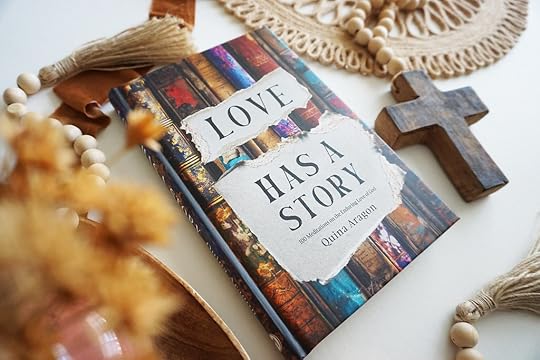


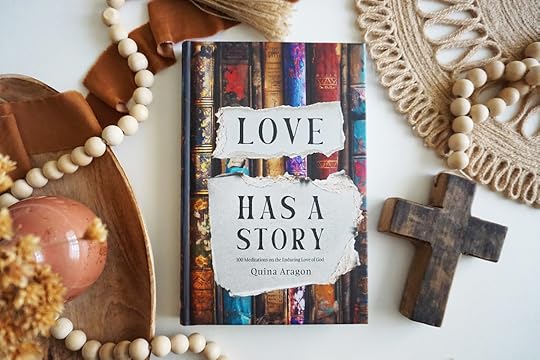
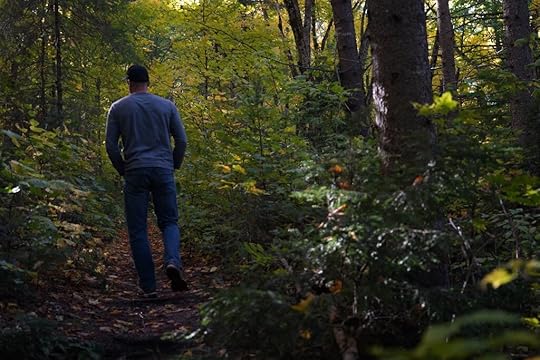
One that has had me walk through the mystery and darkness of prolonged traumas.
“No testimony of God’s indescribable love is boring or unworthy of its retelling. “
One in which the silence of God became a psalm.
Despite the many redemptive movements of God in my life in the last couple years of writing this book—including relocation, trauma therapy, family support, and even financial breakthrough—I’ve struggled to forgive, I’ve struggled with lust, I’ve struggled with intense bouts of anxiety and depression.
I’ve bucked against entrusting my story to our wonderful Wounded Healer.
I’ve cursed in the darkness. I’ve cursed the darkness.
I’ve struggled to know in my bones the love of God.
“I must show you my wounds while pointing you to His—bringing forth life from death, love from shame’s depths.“
How could I, someone who has verbalized more than once in the process of writing this book, “God hates me. He wants to kill me,” and “The world is better off without me,”—how could I pen genuine words on the love of God? I’ve both cried and laughed as I’ve asked myself this question.
I have no business writing about the love of God. But, in my woundedness, I’ve found Christ’s scarred hands holding the pieces of my story gently, compassionately, lovingly.
Thus, I must write. And (author or not) so must you.
In a conversation, in a song, in a social media post, go ahead: “proclaim the excellencies of him who called you out of darkness into his marvelous light” (1 Pet. 2:9). You don’t need to hide from the darker parts of your story.
Maybe they won’t make a film adaptation of your life story. So what? No testimony of God’s indescribable love is boring or unworthy of its retelling. In fact, it’s the unique shape of your own wounds that brings glory to God’s multifaceted love.
So, I must show you my wounds while pointing you to His—bringing forth life from death, love from shame’s depths.
And I hope you’ll do the same, too.
[1] “Historia de un amor,” Carlos Eleta Almaran; editorial Mexicana De Musica Int. S. a. (emmi), Southern Music Publishing Co. Ltd.
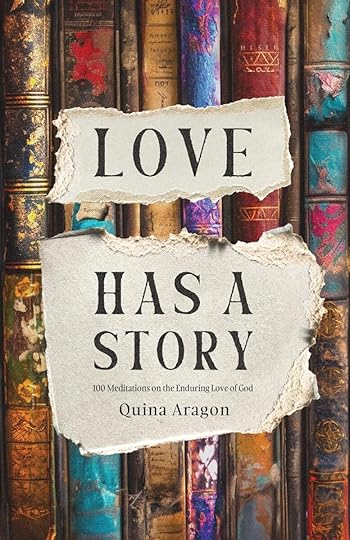
Quina Aragon is an author and spoken word artist residing in Orlando, Florida, with her husband and daughter. They are members of New Creation Fellowship Orlando. Quina is the author of Love Has a Story: 100 Meditations on the Enduring Love of God, as well as a children’s book trilogy: Love Made, Love Gave, and Love Can. You can subscribe to her email list at Quina.Substack.com.
In Love Has a Story, I invite you to explore God’s love as it has existed and moved throughout (and before) time, and how it intends to transform your own life story. I share some of my own story through poetry as well, while encouraging you to consider how your life is meant to be a story about God’s love, too.
{Our humble thanks to Moody Publishers for their partnership in today’s devotional.}
October 3, 2024
A Freeing Shift on Successes, Failures, & How to Frame Your Days Instead
What I keep telling myself as I flail about in the last quarter of the year: “There is no failure, as long as you don’t fail to learn.”
Every failing is another step to success.
There is no failure as long as you don’t fail to learn.
And here I am learning how to raise my 7th child, and how to champion a second year university student, and what it means to be a parent to 5 full-grown adults living their own stories, how to be all that many new daughter-in-loves need to flourish, how to be a brand new Amma to brand new grandbabies, and what it means to be present to aging parents struggling through health complications, while being committed to learning new ways to love the same faithful man for decades so that he can be all he is meant to be, tending every day to a flock of 20-some sheep, investing in church community, training to walk a marathon, and studying as a doctorate student of spiritual formation and soul care.
I’m really bad at all kinds of things. Which is exactly what happens if you’re risking enough to learn all kinds of new things.
Full lives are full of all kinds of failure.

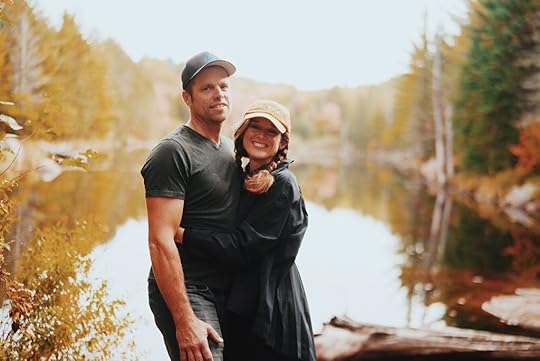



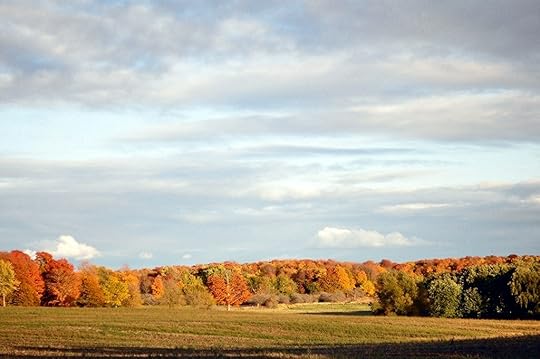
Only succeeding — is actually only proof of lack of growth.
And in these late September days, I’m trying to learn how to make sourdough bread and I smile a bit when it comes out of the oven smelling like an invitation to come home — but I overproofed it and it’s less than ideal, but I’m becoming more than some ideal— I’m becoming more experienced.
When I slip the kinda flopped loaf onto the rack on the counter, I glimpse out the kitchen window, the porch’s perennial garden right there where the roses are being devoured by sawflies and I overcrowded the lilies back in the spring and I didn’t sufficiently contain the hollyhocks who are romping a bit too riotously everywhere now. Every gardening year is an experiment, and actually: Everywhere there is growth, there is experiment, and every grand life is a grand experiment in trying.
You can have a comfortable sense of success, and a life that is ultimately meaningless —or you can live through the discomfort of some sense of failing and into to a far more meaningful life.
As long as I’m still failing, I’m still working on growth.
Only succeeding — is actually only proof of lack of growth.
Maybe the real life work is less about succeeding, and more about becoming a curious student of failure.
May be the every day work is to realize:
You can have a comfortable sense of success, and a life that is ultimately meaningless —or you can live through the discomfort of some sense of failing and into to a far more meaningful life.
The learning curve of all growth is found on the curve of failure.
And after I clean the kitchen counters, feed the sourdough starter, tuck my wee flock of sheep into their little barn, tuck a little girl into her old bed, read the last chapter of the text for the doctorate studies and turn out the last light, that’s what I’m thinking at the very end of the day — that maybe, in some ways, this entire frame of success and failure needs turning all around and upside down.
Success and failure as constructs are not terms found in the Bible, success and failure are not terms of biblical measurement, success and failure are not what God’s world are about.
When historians and archaeologists look back at the successful kings of Israel, those who won wars and accolades, those who built monuments and kingdoms and whole catalogues of accomplishments, who they is deem as one of the most successful and powerful kings ever in Israel, the one who they credit with the building of a royal citadel and palace at Samaria, the construction of the massive fortress at Jezreel, and historical records like the Mesha Inscription noting his powerful reign that expanded Israel’s dominion to include northern Moab east of the Jordan River — they point, not to the Israeli King you might expect — but to King Omri. Assyrians were so in awe of King Omri that they actually called the whole of Israel “Omri-land”
But, unlike historians, apart from saying how Omri came to power, the actual Bible makes not one mention of King Omri’s accomplishments.
Omri may be deemed historically as the greatest King, but the One who is very King of the Universe names David as the greatest king, because David was a man after His own heart and the heart of God is Love.
Who the annals of history deems a success, is very different than who the God of Love names as His.
Because for God: Success isn’t about the accomplishments of your hands, but the posture of your heart.
Because for God: Success in this world that doesn’t last — isn’t lasting success.
Success in this world that doesn’t last — isn’t lasting success.
Because the reality is: This isn’t actually a ladder world.
This isn’t a world about climbing some rungs and relentlessly trying to avoid slipping some rungs. It isn’t a ladder world.
This is actually a love world. For God so loved the world — that He gave. This is a love world and love lives given.
This is a world about the givenness of love, about living given— this is a world of gifts.
This is a gift universe. And everything is about gift, whether we live with a heart posture to receive the free gift of His Son, the gift of His love, of His joy, of His strength, the gifts of His grace upon grace, and gift of the wisdom of His ways — and how we are living in ways that become a gift.
This isn’t a ladder world, all about climbing rungs. This is a love world, and all about living given.
Everything in the real world that actually lasts has little to do with some culturally determined standard of success and failure, but about getting out of bed every day and asking:
How can I be a gift today?
And getting into bed and asking:
How did I live given today? How was I gift?
Because at the end of your days, it won’t matter much if your obituary boasts of how many rungs you climbed or what ladders you scaled. Because what carries real weight in the real world that lasts is love, and love lives given.
Successes that are about notice and number and scale, can’t compare to the weight of a gift that is for the one, and for an audience of One who left the 99 for the one.
God isn’t interested in the ladders we climb, but the love we give.


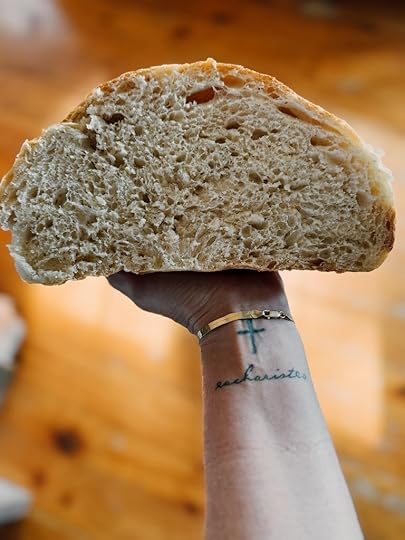
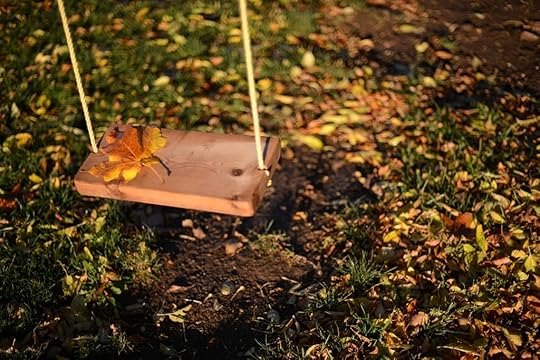




There is no failure, as long as you are living given, as long as you are being a gift.
The sourdough may not rise, and the roses may be all eaten by sawflies, and the laundry may pile, and the bills may pile, and the to-do lists may pile, and this whole chapter of the story right now might be messy and tender and not going the way you hoped or imagined, but in the real world that lasts, in the love world, in the gift universe, all there is to really learn is:
There is no failure, as long as you are living given, as long as you are being a gift.
I’m a slow and happy learner, and when I cut the sourdough loaf in half and turn it around, I’m reframing everything in a love world that doesn’t have ladders, and I see it a whole other glorious, grateful way.
And I grab some parchment paper and twine, and wrap up this little imperfect loaf –because even it looks like a love gift meant to be given away.
Wanna Change Your Life? Want to Ground Yourself in a Gift Universe, in a Love World, in Love Himself?
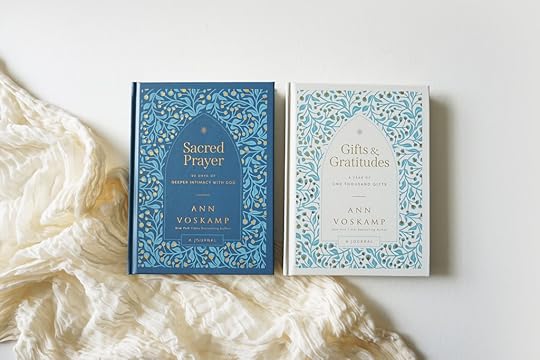
Pre-Order either of both of my 2 (!!) New Journals with you & all these free gifts are yours!
Your complimentary enrolment in Ann’s 4-Week Journaling Masterclass: FRESH PAGES with video teachings & live-streamed classes. Learn how to write to change your life!2. A welcome to our private SACRED Prayer Community, gathering together on Zoom from the quiet, intimate space of The Village Table.
3. Your own “Go Deeper” Journaling Toolkit with journaling prompts, a prayer guide, Identity in Christ printable bookmarks with daily notes to soul, a playlist & a resource guide to our favorite journaling supplies!
4. Your own seat in our private online community of journalers, with regular live-streamed journaling retreats
5. The chance to win your own writing retreat on Ann’s farm, staying in a shepherd’s hut on the river…
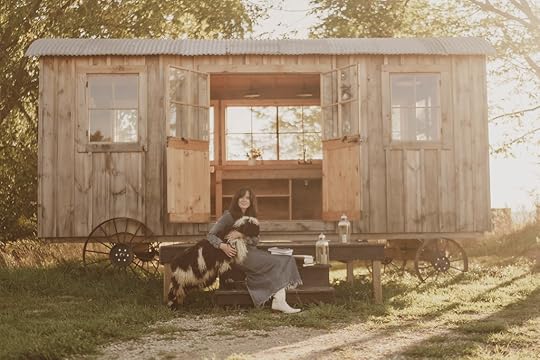
Just Pre-Order either one of our Life-Changing Journals right now, & receive all these free gifts, including: Our Free 4 Wk JOURNALING MASTERCLASS: FRESH PAGES
Pre-order now to begin with October 1st! Fresh Pages, Fresh Us!
October 1, 2024
In Days Like These, How Do You Really Follow Jesus?
If there is one thing that continues to surprise me as I follow Jesus, it’s the difficulty of the journey, the unexpected delays, the detours, the disappointments, and the waiting. Despite what I know about God, I still catch myself taken aback by the amount of suffering endured in the pursuit of one’s calling. It is my hope that Lina AbuJamra‘s new book will inspire hope in your heart as you continue to follow Jesus even when it hurts. It’a a joy to welcome Lina to the farm’s table today…
Guest Post by Lina AbuJamra
“Every single person who has been greatly used by God has had to go through the wilderness.“
If you’ve responded to God’s call in your life, chances are you’re either in the wilderness, are headed to the wilderness, or have just come out of the of wilderness.
Throughout the pages of Scripture, you will find that the most popular place to learn God’s ways is smack in the middle of the wilderness. Every single person who has been greatly used by God has had to go through the wilderness.
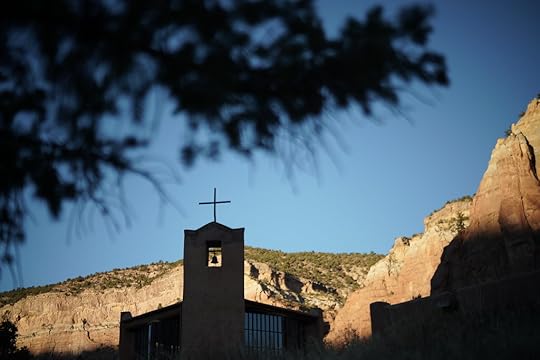

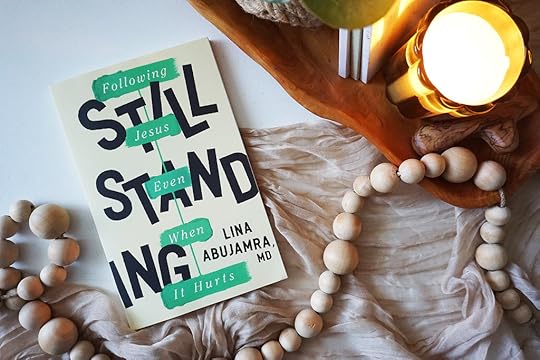
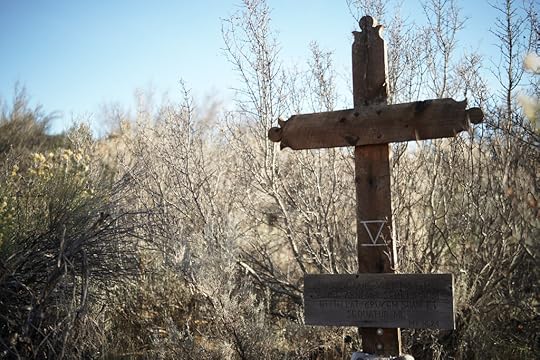
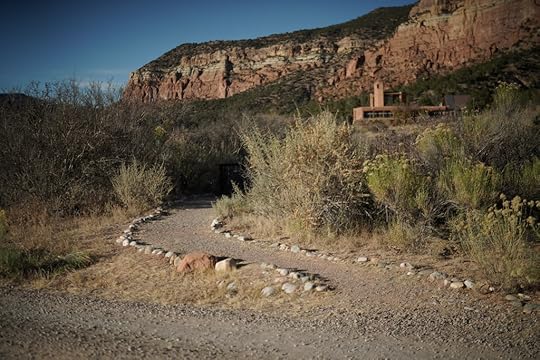
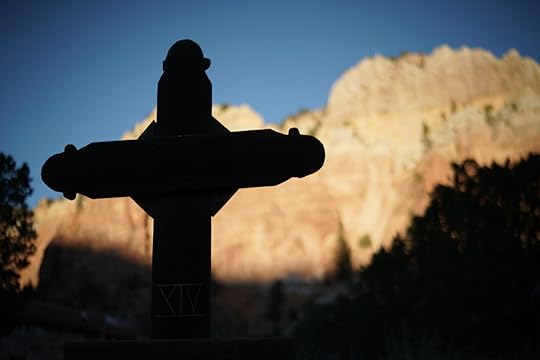
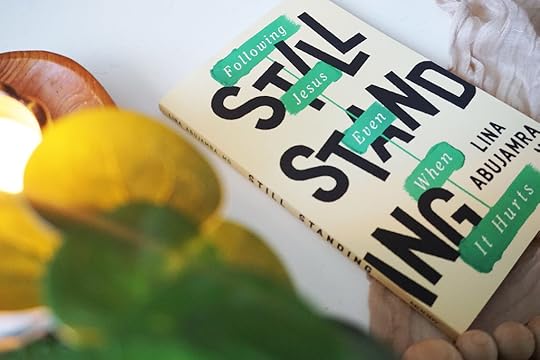
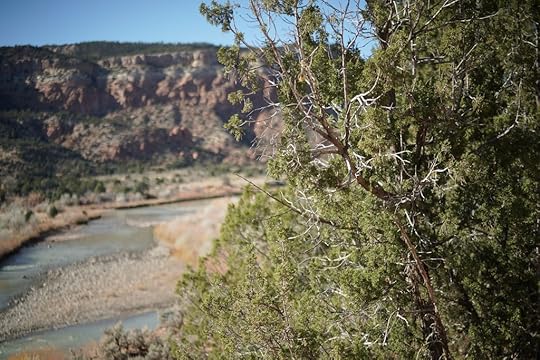
“The lesson is obvious: when there’s no one around to impress, the Lord will impress your heart with His presence.“
Take David for example. Shortly after he was anointed by Samuel to be the king of Israel, he miraculously killed Goliath. Everybody loved David for a while. He was young and handsome and on a winning streak that was sure to get him the Heisman. Even King Saul became enamored with David.
It didn’t take long for the tide to turn for David, as the next ten years would show. David spent those years running away from Saul, hiding in a cave of the greatest wilderness of his life.
How could a guy who was so obviously called by God end up hiding for his life? For a while, David was as alone as one could get.
It is out of this loneliness that emerged one of the strongest kings of all times. David would become known as a man after God’s own heart. He emerged as a man committed to the Lord and strong in His might. David’s time in the wilderness yielded a man now free to rule a nation.
“It is when others become shadows allowing God’s presence to settle over you that you will finally understand that without Christ you can do nothing, be nothing, and accomplish nothing. “
The lesson is obvious: when there’s no one around to impress, the Lord will impress your heart with His presence.
David is not the only follower of God who found himself in the wilderness. All the way from Abraham, to Moses, to the great prophet Elijah, the wilderness is a familiar place for the one whom God has called.
The New Testament is also filled with examples of Christ’s followers who learned to be alone with the Lord. There’s Paul, who went alone to the desert for three years before God launched him into ministry. Peter often found himself alone on a rooftop or in a prison cell. And John, the beloved disciple, wrote some of his best books exiled on an island.
It is when surrounded by the deafening silence that the soul quiets enough to hear God speak. It is when others become shadows allowing God’s presence to settle over you that you will finally understand that without Christ you can do nothing, be nothing, and accomplish nothing.
Do you know the wilderness of loneliness? Are you in it now?
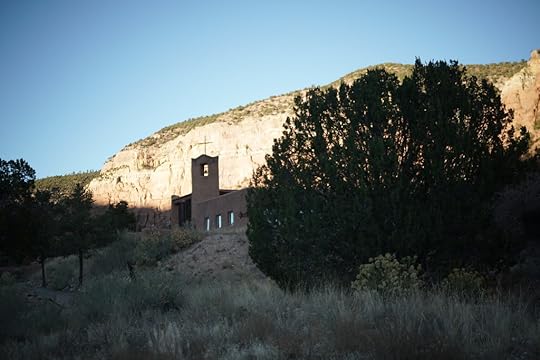

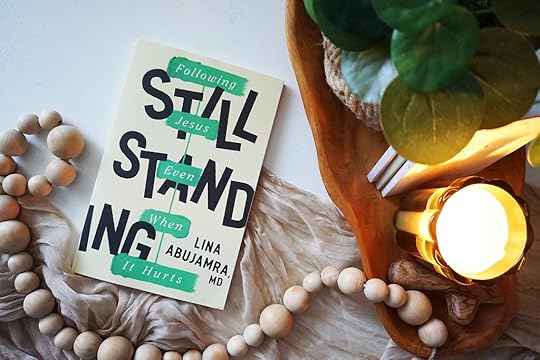


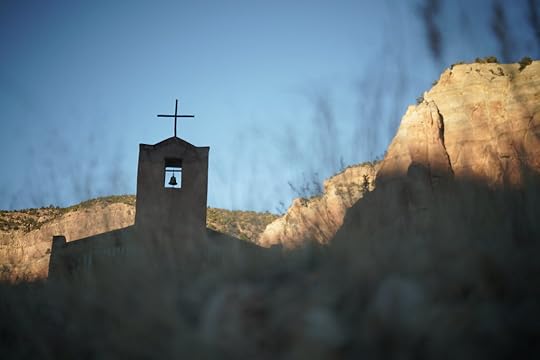
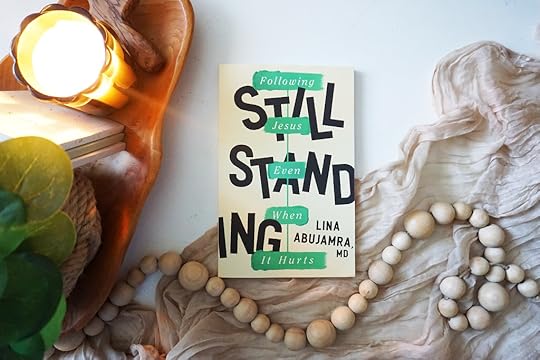

I am quite familiar with being alone. I have lived alone for over twenty years now. To be honest with you, I like it that way. It’s peaceful and allows me the freedom to write. But the wilderness of loneliness that I’m referring to is not one you seek by choice.
I’m talking about a wilderness that can hit you in the midst of a crowded room or when you’re wide awake at three in the morning. You suddenly feel an ache that you don’t quite recognize. You long for something, for someone.
You almost feel afraid.
“Therefore, behold, I will allure her, and bring her into the wilderness, and speak tenderly to her. And there I will give her her vineyards and make the Valley of Achor a door of hope” Hos. 2:14-15
My initial instinct is to misunderstand that kind of loneliness. I resent it. I hate it. I long to escape it. I am tempted to check my email or Facebook. I turn on the television and strain for the noise of human voices. I yearn to fill the gaping hole of my heart.
It catches me by surprise, this aching loneliness. It’s like an uninvited guest that I can’t quite bid farewell; it hovers over me. I close my eyes in the hope that sleep will erase it, but I wake up and it’s still there. I find it my constant companion.
Are you familiar with this kind of wilderness? It may be a wilderness that comes from the rejection of those by whom you long to be accepted. It may be a wilderness that comes from seeing people as they really are, sinners in need of grace. It may even be a wilderness that comes from being forgotten by others.
It is precisely in this wilderness that God waits to step in and fill your deepest longings. Can you hear in your wilderness the loving voice of One calling out your name?
Few verses have ministered to me like the words of the prophet Hosea: “Therefore, behold, I will allure her, and bring her into the wilderness, and speak tenderly to her. And there I will give her her vineyards and make the Valley of Achor a door of hope” (Hos. 2:14–15).
God tenderly calls out to you in the wilderness. The problem is that most of us are not trained to hear His voice. Even worse, most of us resist hearing His voice, longing for something else to fill us. We have replaced the knowledge of God with the worship of people.
From the chapter “People Pleasing”

Lina AbuJamra is a Pediatric ER doctor, now practicing telemedicine, and founder of Living With Power Ministries. Her vision is to bring hope to the world by connecting biblical answers to everyday life. A popular Bible teacher, podcaster, and conference speaker, she is the author of several books including her most recent ones, Still Standing and Don’t Tell Anyone You’re Reading This, and her Bible Study series Mapping the Footsteps of God. In her “spare” time, she provides medical care and humanitarian help in disaster areas and to refugees in Lebanon. Learn more about her at LivingWithPower.org.
Still Standing shares the amazing and beautiful reality that we can have joy and confidence amidst life’s most difficult circumstances. Without denying the real pain many of us carry, Still Standing shows how God’s presence is promised in every valley, trial, and tribulation and that following Jesus is not only possible but the only way to happiness even when it hurts.
{Our humble thanks to Moody Publishers for their partnership in today’s devotional.}
September 27, 2024
When you wonder: How God Feels About All Kinds of Storms & Flooding Grief?
When you see the wreckage of people’s homes floating out to sea, and the devastation twisting up quiet, small town streets, and families wondering where to even begin to pick up their lives… how in the world do things stand in a world flooding with all kinds of catastrophes like this?

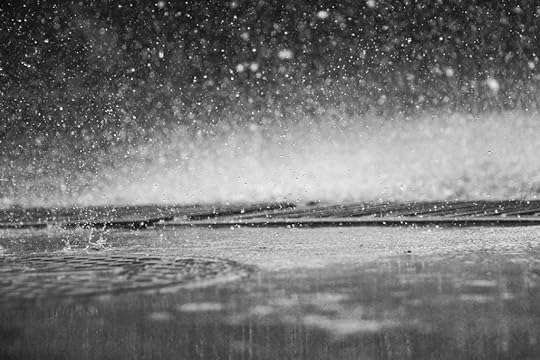
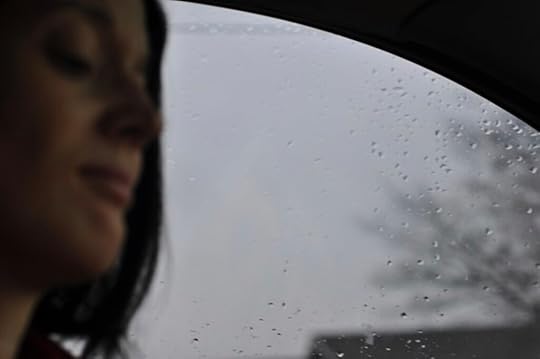
How does the sky just suddenly spin mad over the weekend and pelt whole states into a state of emergency?
Who can stand when your heart’s flooded with grief?
So much of life is mystery, but what you can know is: God’s heart overflows in the midst of grief.
“… His heart was filled with pain,” is what He says. {Gen 6:6}
God has a heart. And it hurts. In the face of grief, in the midst of our storms, God’s heart fills not with just with a a few drops of ache, not just with a slow drip of sadness — His whole massive heart fills, swells, burns with this raw, relentless pain.
In the midst of the storm, all of God floods with pain.
Wherever there is brokenness in the world, God’s heart breaks.
What grieving mother could look around at the flooding, and hear her baby crying and forget her little one — what mother could just up and forget her always-baby?
And God whispers hoarse: That mother whose heart is bound to her child’s — doesn’t compare to how your Father’s heart is bound to you. {Isa 49:15}
The Lord of the Universe, He’s lashed Himself to us. And He didn’t need to. But He tied the knot Himself. God who hung the stars, He takes a thread of His heart and ties His to ours. God tied His heart to yours so when you feel pain — He fills with shattering pain.
So when we howl: “If there’s a God who really cares, He’d look at this world and His heart would break.”
And God looks to the Cross and says –– My heart did.
Wherever there is brokenness in the world, God’s heart breaks.
On that Cross, they speared His side and pierced straight into His heart filled with pain and it was the water and blood of His right broken heart that gushed right out.
It’s the quantum physics of God: one broken heart always breaks God’s in two. We never cry alone.
It’s the quantum physics of God: one broken heart always breaks God’s in two. We never cry alone.
And our crying God, He catches every tear in His bottle — God catches every one of our falling tears and He’s keeping us from falling apart.
Weather forecasters keep tracking the storm, keep updating with paths for potential flash flooding.
And there are storms that are only dark canvases for God’s lightning glory.
Storms can be a stage for epic light.
Storms can be a stage for God-light to shine through the Heroes and Givers and Gifters and Rescuers and Responders and Pray-ers.
God catches every one of our falling tears and He’s keeping us from falling apart.
And in the midst of all our storms, this is always true:
Sometimes God will calm the storm for you — but sometimes God will calm you for the storm.
Sometimes God calms the storms — and sometimes the storm stills swirl, and He calms our fears.
All storms ultimately still to the sound of One Voice.
Sometimes God will calm the storm for you — but sometimes God will calm you for the storm.
And there are pray-ers around the world who are keeping prayer watches and God is with us in all the storms. And all I can think is– Very God tied His heart to very ours — and the tears of God are the essence of Time. That’s what the grieving philosopher Nicholas Wolterstorff wrote: “Tears are the meaning of history.”
Time only continues on in this impossibly suffering world — because God Himself is willing to keep suffering the impossible with us.
That’s what we all share in the midst of all kinds of storms: God shares in the grief with all of us, and He knows explanations can be cold and His embrace is warm.
In the centre of all our storms, there is the warming light of Christ:
There’s a God who is our Light house, who stays with us and rightly orients us through the storms.
And there’s a God who is our Light house, who knows how storms stir us to love the Light House long after the storms have passed.
And as we watch the news, the forecasts, the skies, and the news of our friends, sometimes we can only nod, not trusting our voices not to break — but trusting, in the midst, in everything, God’s heart breaks with all the broken.
There isn’t a storm anywhere that doesn’t come too with the falling tears of God.
September 23, 2024
When you Feel Like A Failure: Learning to be Dependent on Our Dependable God
Gretchen Saffles knows what it’s like to struggle to put Jesus first daily. During a season of spiritual discouragement, a simple three-word phrase became planted in her heart that helped reframe how she desired to start her days, spend her time, and shape her mindset: Word before world. When Gretchen began looking first to Jesus, she realized that while the Bible never changes, it always changes us. It’s my joy to open God’s Word and grow in grace with Gretchen on the farm porch today…
Guest Post by Gretchen Saffles
“He spread a cloud for a covering, and fire to give light by night. They asked, and he brought quail, and gave them bread from heaven in abundance. He opened the rock, and water gushed out; it flowed through the desert like a river. For he remembered his holy promise, and Abraham, his servant”( Psalm 105:39-42).
I slip out the door of my daughter’s room and lean my head on the scuffed-up wall in front of me.
I’m such a failure, I think as I hear my baby crying and one of my sons yelling for me downstairs. I’m failing as a mother, failing as a friend, failing at organizing our home and our schedule, failing at keeping my attitude like Christ’s.
The list could go on, but at the core is the belief that I have to be perfect. If perfection is the bar I’m reaching for, then I am failing.
“I am imperfect and dependent; he is perfect and perfectly dependable.“
I am failing at being limitless.
I am failing at being God.
That’s because I was never meant to be perfect or limitless—and I certainly wasn’t meant to be God.
I am created; he is my Creator.
I am bound by time, by the ticking of the clock, and by the restraints of my body; he is eternal, limitless, omnipresent.
I am imperfect and dependent; he is perfect and perfectly dependable.

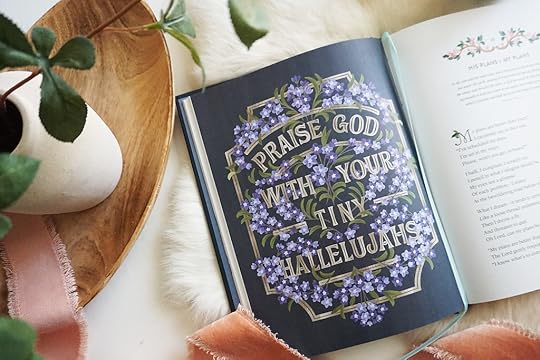



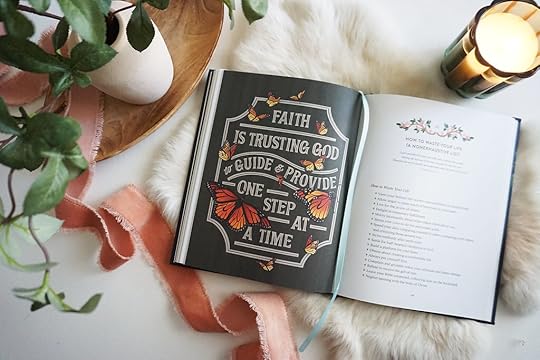

I slide to the floor, listening to my baby wrestling herself to sleep in her crib. She is overtired, and so am I. She’s dependent on me to care for her—to provide food and protection and even to put her down for a nap.
Dependent. This three-syllable word swirls around in my head. What an accurate way to view who I am too.
I am dependent on my dependable God, I repeat to myself.
Life looks different through this filter. More hopeful. More faithful. More grateful. More joy- full .
During the Israelites’ forty-year stint of wandering in the wilderness, they were utterly dependent on God. They depended on God for direction, so he led them with a pillar of cloud by day and a pillar of fire by night (see Exodus 13:21).
“I am dependent on my dependable God… Life looks different through this filter. More hopeful. More faithful. More grateful. More joy-full.“
They depended on God for victory, and he taught them countless times that victory belonged to him (see Exodus 14:18; 17:15-16).
They depended on God for food, so he rained down a mysterious bread from heaven called manna (see Exodus 16:4).
They depended on God for water, and God provided through a rock (see Exodus 17:1-7).
They depended on God for wisdom about how to live, so God provided the Law (see Exodus 20–24).
They depended on God for a place of worship, and God provided the Tabernacle (see Exodus 25–40).
But the Israelites’ dependence did not end once their wandering was over. Once they were in the Promised Land, they still depended on God for forgiveness and restoration. They still depended on God as they waited for the promised Messiah.
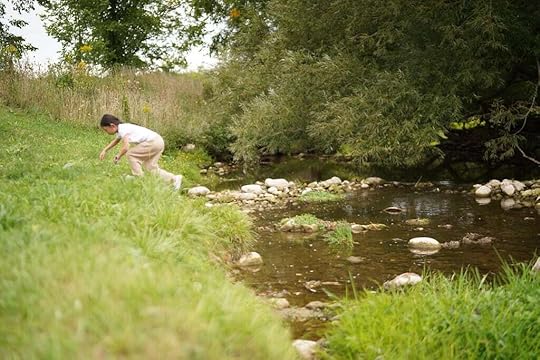
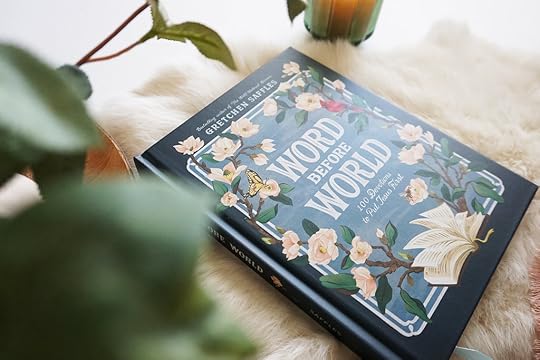

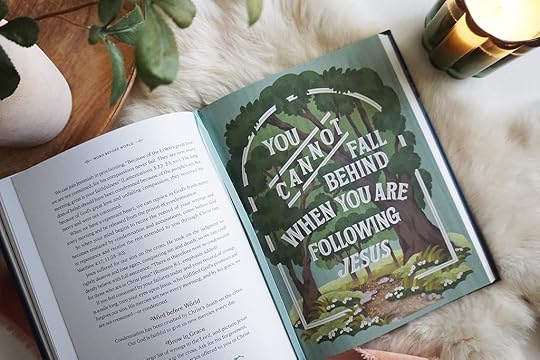

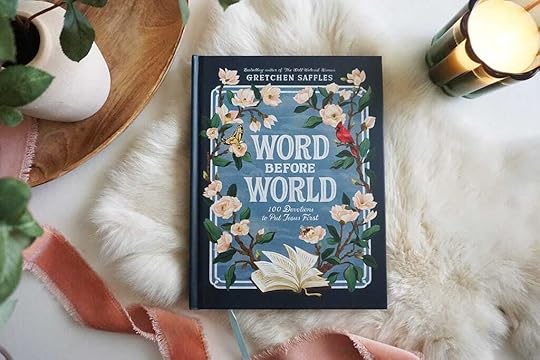

Why do we think we can live apart from the help of God?
“But the truth is, we are fully dependent on God—and he is fully dependable.“
Our pride persuades us we can do everything on our own strength. We think we don’t need to be forgiven because we haven’t done anything that wrong, or we don’t need God-fueled patience because we can muster it up from our own reserves, or we don’t need help because we are self-sufficient. But the truth is, we are fully dependent on God—and he is fully dependable.
I push myself up from my kneeling position on the carpet and walk into my daughter’s room, humbled by the Holy Spirit’s conviction, hopeful in the help of my fully dependable God.
Grow in Grace: How have you labeled yourself a failure? Does this line up with the truth of how God sees you through the eyes of grace? How can you change your perspective to focus on God’s dependability to forgive, provide, guide, and offer a fresh start in Jesus?
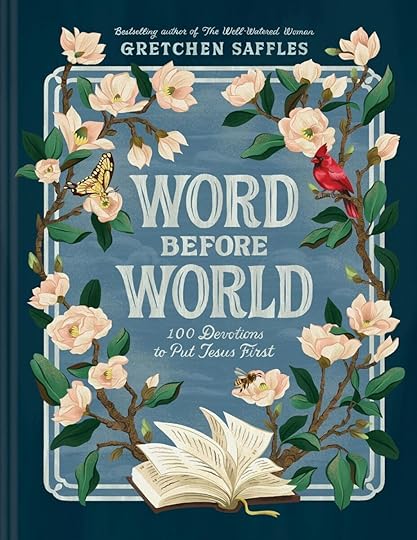
Gretchen Saffles is the founder of Well-Watered Women, an online ministry that reaches women worldwide with the hope of the gospel. She is the bestselling author of The Well-Watered Woman: Rooted in Truth, Growing in Grace, Flourishing in Faith; has written several Bible studies; and is the creator of the Give Me Jesus journal, a tool to help women study Scripture daily. On any given day, you can find her with a cup of coffee in hand, a message stirring in her soul, and a God-sized dream in her heart. Gretchen lives in Atlanta, Georgia, with her husband, Greg, and three children, Nolan, Haddon, and Emelyn.
In her newest devotional, Word before World: 100 Devotions to Put Jesus First, Gretchen reminds us that anytime is the right time to read the Word of God. Through Gretchen’s honest struggles and encouraging teaching, you’ll discover ways to
conquer the daily distractions that get in the way of time with Goddevelop a daily rhythm of seeking Jesusset aside your phone, lists, and plans in order to seek direction and nourishment in God’s Word insteadtransform your worldview, schedule, dreams, and desires to align with God’s purpose for your lifeYou are invited to experience God’s faithfulness and goodness in the pages of Scripture. Cultivate a deep love for God in this 100-day devotional journey as you learn to put God’s Word before the distractions of this world, believing that he will meet your every need.
{Our humble thanks to Tyndale for their partnership in today’s devotional.}
Ann Voskamp's Blog
- Ann Voskamp's profile
- 1368 followers



